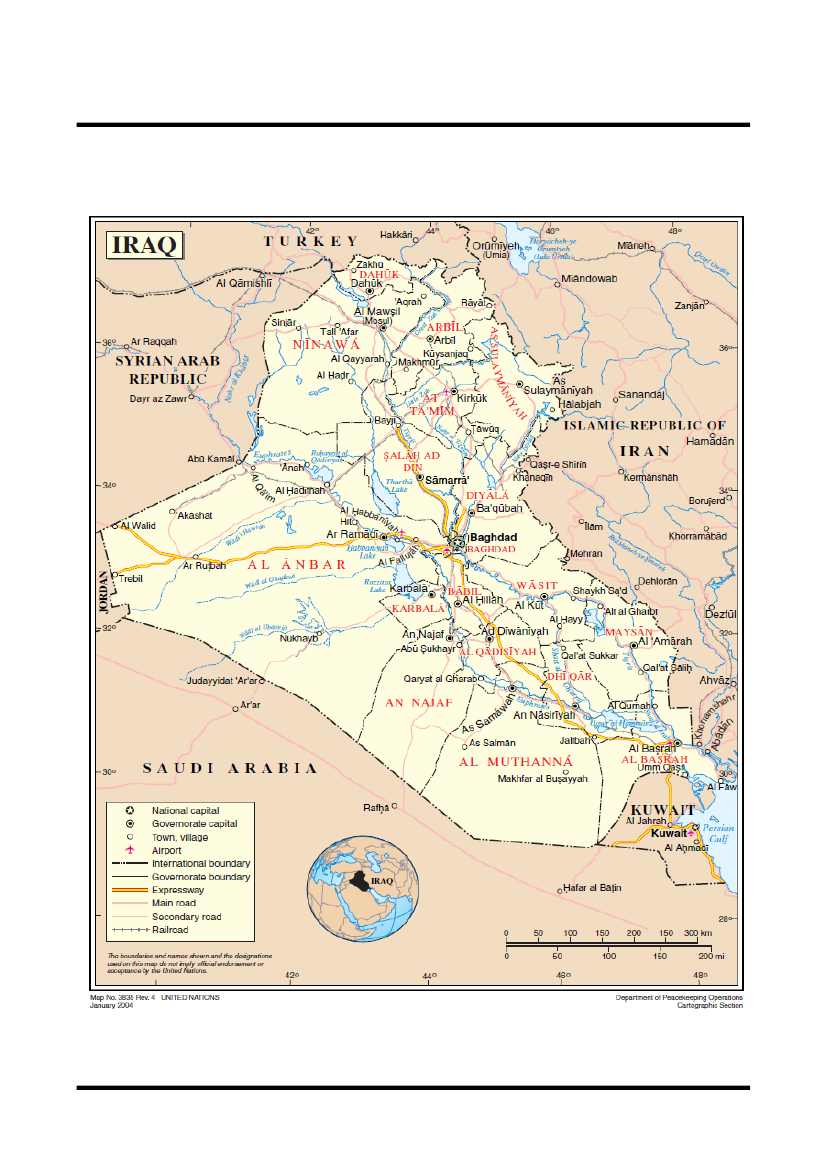Udvalget for Udlændinge- og Integrationspolitik 2009-10
UUI Alm.del Bilag 189
Offentligt
5/2010
ENG
Security and Human Rights in South/Central IraqReport from Danish Immigration Service’s fact-finding mission to Amman, Jordan andBaghdad, Iraq25 February to 9 March and 6 to 16 April 2010
Copenhagen, September 2010Danish Immigration ServiceRyesgade 532100 Copenhagen ØPhone: 00 45 35 36 66 00Web: www.newtodenmark.dkE-mail: [email protected]
Overview of fact finding reports published in 2008, 2009 and 2010Protection of victims of trafficking inNigeria,Report from Danish Immigration Service’s fact-findingmission to Lagos, Benin City and Abuja, Nigeria, 9 – 26 September 20072008: 1Protection of victims of trafficking inGhana,Report from Danish Immigration Service’s fact-findingmission to Accra, Ghana. February 25 to March 6 20082008: 2Recruitment of IT specialists fromIndia,An investigation of the market, experiences of Danishcompanies, the attitude of the Indian authorities towards overseas recruitment along with the practices ofother countries in this field. Report from the fact finding mission to New Delhi and Bangalore, India4th to 14th May 20082008: 3Report of Joint British-Danish Fact-Finding Mission to Lagos and Abuja,Nigeria.9 - 27 September2007 and 5 - 12 January 20082008: 4Cooperation with the National Agency for the Prohibition of Traffic in Persons and other related matters(NAPTIP). Report from Danish Immigration Service’s fact-finding mission to Abuja,Nigeria.14 to 24February 20092009: 1Security and Human Rights Issues in Kurdistan Region ofIraq (KRI),and South/Central Iraq (S/CIraq), Report from the Danish Immigration Service´s (DIS), the Danish Refugee Council´s (DRC) andLandinfo’s joint fact finding mission to Erbil and Sulaymaniyah, KRI; and Amman, Jordan, 6 to 23March 20092009: 2Honour Crimes against Men in Kurdistan Region ofIraq (KRI)and the Availability of Protection,Report from Danish Immigration Service’s fact-finding mission to Erbil, Sulemaniyah and Dahuk, KRI,6 to 20 January 20102010: 1Entry Procedures and Residence in Kurdistan Region ofIraq (KRI)for Iraqi Nationals, Report fromDanish Immigration Service’s fact-finding mission to Erbil, Sulemaniyah, Dahuk, KRI and Amman,Jordan, 6 to 20 January and 25 February to 15 March 20102010: 2Human rights issues concerningKurds in Syria,Report of a joint fact finding mission by the DanishImmigration Service (DIS) and ACCORD/Austrian Red Cross to Damascus, Syria, Beirut, Lebanon,and Erbil and Dohuk, Kurdistan Region of Iraq (KRI), 21 January to 8 February 20102010: 3Allegations against the National Agency for the Prohibition of Traffic in Persons (NAPTIP) andwarnings against return toNigeria,Report from Danish Immigration Service’s fact-finding mission toAbuja, Nigeria, 9 to 17 June 20102010: 4Security and Human Rights inSouth/Central Iraq,Report from Danish Immigration Service’s fact-finding mission to Amman, Jordan and Baghdad, Iraq, 25 February to 9 March and 6 to 16 April 20102010:5
Security and Human Rights in South/Central Iraq
ContentsIntroduction and Disclaimer................................................................................................................. 31.Security, human rights and indiscriminate violence in South/Central Iraq ................................. 51.1.1.2.Baghdad ............................................................................................................................... 10Disputed areas, Ninewa (Mosul), Diyala (Khanaqin) and Tameen (Kirkuk) ..................... 11
Disputed areas ............................................................................................................................ 11Ninewa (Mosul) ......................................................................................................................... 12Diyala (Khanaqin) ...................................................................................................................... 13Kirkuk ........................................................................................................................................ 131.3.1.4.1.5.2.Armed groups, insurgent groups and criminal gangs .......................................................... 14Security and humanitarian concerns.................................................................................... 15Security and returns ............................................................................................................. 17
Security and human rights for ethnic and religious communities .............................................. 212.1. Non-Arab ethnic communities: Kurds (incl. Feyli Kurds), Turkmen, Assyrians, Chaldeans,Shabaks .......................................................................................................................................... 232.2.2.3.Palestinians .......................................................................................................................... 23Religious communities: Christians, Sabean-Mandeans, Yazidis, Jews .............................. 24
3. Security and human rights for other groups ................................................................................... 253.1. Professional groups ................................................................................................................. 263.1.1. Judges and lawyers........................................................................................................... 263.1.2. Journalists......................................................................................................................... 283.1.3 Government officials......................................................................................................... 283.2. Persons cooperating with US forces, international organisations or foreign companies ........ 283.3. Former Baathists ..................................................................................................................... 293.4. Forced recruitment, including recruitment of children ........................................................... 304. Availability of protection from authorities against non-state actors .............................................. 334.1. Persons threatened by militias................................................................................................. 334.2. Persons involved in private disputes ....................................................................................... 334.3. Women at risk of honour crimes ............................................................................................. 34
1
Security and Human Rights in South/Central Iraq
5. Protection and tribal network ......................................................................................................... 356. Civil society organisations and protection ..................................................................................... 377. The judiciary and law enforcement ................................................................................................ 387.1. The judiciary ........................................................................................................................... 397.2. Law enforcement..................................................................................................................... 427.3. Access to fair trial ................................................................................................................... 447.3.1. Persons suspected of terrorism or insurgent activities ......................................................... 467.3.2. False accusations .................................................................................................................. 468. Internal Flight Alternative in S/C Iraq ........................................................................................... 48Individuals and organisations consulted ............................................................................................ 49Abbreviations ..................................................................................................................................... 50Annex 1: Map of Iraq ......................................................................................................................... 52
2
Security and Human Rights in South/Central Iraq
Introduction and DisclaimerThe Danish Immigration Service (DIS), Documentation and Research Division has undertaken twofact-finding missions concerning South/Central (S/C) Iraq and Iraq‟s disputed areas.1The missionstook place in Amman, Jordan from February 25 to March 9, 2010 and in Kurdistan Region of Iraq(KRI) and Baghdad, Iraq from April 6 to April 16, 2010. All information for the report at hand wasgathered in Amman and Baghdad while a stay in KRI was chiefly for logistical and planningpurposes concerning the trip to Bagdad. The first part of the mission which took place in Ammanwas carried out with participation of Country of Origin Information Service (COIS), UnitedKingdom (UK) Border Agency for the purpose of training on how to conduct fact-finding missions.The aim of the mission was to gather updated information on the general security and the humanrights situation in S/C Iraq as well as in disputed areas, including the situation concerning ethnicand religious minorities, as well as information concerning availability of protection fromauthorities and tribes. In addition, the delegation also gathered information on the judiciary and lawenforcement as well as Internal Flight Alternative (IFA) in Iraq.In Jordan and Iraq, the delegation consulted representatives of international organisations includingUnited Nations (UN) agencies and International Organization for Migration (IOM), InternationalNon-Governmental Organisations (INGOs) and Non-Governmental Organisations (NGOs).Additionally, the delegation consulted two sources that requested to be cited as „a source inBaghdad‟ and „a reliable source [in] Iraq‟. A list of all interlocutors is included at the end of thisreport. All interlocutors have been referred to as requested by them.All interlocutors consulted were informed that the delegation‟s mission-report would be a publicdocument. All interlocutors were also informed that they would have their statements forwarded tothem for corrections, comments and approval. The interlocutors accepted to have their finalstatements included into the report at hand.It should be noted that in a few cases the delegation (i.e. the authors of this report) found itnecessary to carefully adjust or clarify phrases in some of the approved notes by adding minorsupplementary explanations. These small adjustments have been marked with a closed bracket […].The delegation received extensive support from the Danish Embassy in Baghdad during itspreparations and the visit in the city. The Danish Embassy provided the delegation with logisticaland practical support and organized the delegation‟s meetings in Baghdad.The delegation to Amman and Baghdad comprised Jens Weise Olesen, Chief Adviser (Head ofDelegation) and Vanessa Worsøe Ostenfeld, Regional Adviser, both Documentation and ResearchDivision, DIS. Stewart Wheatley, COIS, UK Border Agency, UK Home Office participated in themission to Amman as a trainee and the report at hand is the sole responsibility of the DIS.Finally, publication of the report at hand was delayed as the delegation awaited approval ofstatements from an individual source – „a reliable source [in] Iraq‟- with central contributions to thereport.1
Iraq‟s disputed areas comprise parts of the Governorates of Tameem, Ninewa, Salah Al-Din and Diyala.
3
Security and Human Rights in South/Central Iraq
Lastly, it should be noted that the report does not contain information other than that which wasgathered up until mid-April 2010.The report is available on DIS‟s website:www.newtodenmark.dk
4
Security and Human Rights in South/Central Iraq
1. Security, human rights and indiscriminate violence in South/CentralIraqFrancine Pickup, Head, Inter-Agency Information and Analysis Unit (IAU), Strategic PlanningAdvisor, Office of the Deputy Special Representative of the Secretary-General and Resident andHumanitarian Coordinator (ODSRSG RC/HC), Amman stated that despite a downward trend in theoverall number of security incidents in Iraq from August 2007 to December 2009, the proportion ofcivilian casualties is shown to have increased steadily, with figures for December 2009 showingover 70% of all casualties classified as civilian.A new information tool developed by IAU, providing a detailed breakdown of attacks andcasualties throughout Iraq, both by Governorate and category of attack, will be available shortly viatheir website: www.iauiraq.org.The UN Office for the Coordination of Humanitarian Affairs (OCHA) priorities have refocusedmore on the development context and capacity building in light of the improved overall securitysituation of the last twelve months. Concerning the latest security-related trends, potential tribalaspects of violence have not been explored as yet. Any kind of analysis of tribal or ethnic violenceis difficult to assess when it comes to determining which groups are specifically at risk.Reporting limitations make it difficult to determine if violence could be considered indiscriminateor not. It was added that compiling analyses with reference to ethnic or religious indicators iscomplex as government and some organisations and agencies are against it. Violence is also linkedto economic circumstances rather than political which is often overlooked as the primary focus ispolitical violence and not the violence caused by criminals and gangs.With regard to current security trends, Fyras Mawazani, Executive Director, NGO CoordinationCommittee for Iraq (NCCI), Amman, stated that although there has been a decrease in the numberof incidents since the beginning of 2007, the proportion of civilian casualties is on the increase withboth targeted and indiscriminate attacks occurring. NCCI confirmed the statistics on causalitiesprovided to the delegation by Francine Pickup, IAU, ODSRSG RC/HC, Amman. Fyras Mawazani,NCCI, Amman, added that earlier lots of attacks were military and involving insurgent groups, andthese incidents have dropped considerably during the last couple of years.As foreign troops are leaving Iraq, the number of attacks on these decreases and thus the number ofcausalities among these troops drops. However, even though insurgents target foreign and Iraqitroops and government institutions, including ministries it is very often civilians who becomevictims of such attacks.A source in Baghdad stated that in the last six months the situation Iraq is finding itself in clearlyone of internal conflict where protection of the civilian population does not exist.The source agreed with Francine Pickup, IAU, ODSRSG RC/HC, Amman that the securitysituation in Iraq for ordinary citizens has not improved and that there is still a lack of protection.A reliable source [in] Iraq stated that even though the political side of the source would like to seean improvement in the overall situation in Iraq an improvement in the security and human rightssituation in Iraq is very limited. It was added that the current security environment is fragile andunpredictable and one in which security deteriorates rapidly. There is no real improvement in
5
Security and Human Rights in South/Central Iraq
security in Iraq. While the number of attacks and security incidents may have dropped, this is noindication of a safer environment.The current security environment impacts on how the source can operate, adding that escorts whichare mandatory for movement are not always available. A movement of two kilometres in the city ofBaghdad could take a week to organize and access to grass roots is not easy. According toinformation from sources in Baghdad, Basra, Kirkuk, Mosul and Erbil, direct access to what ishappening on the ground is limited and one is always faced with lengthy procedures in order tocarry out activities. For example, a visit to a prison would take months to prepare. It is right toconclude that only “the tip of the iceberg” is probably known to the reliable source when it comes toobtaining information on human rights violations in Iraq.It was stated that generally, it is difficult to come to a firm conclusion as to who is most at risk inS/C Iraq. It was further explained that generally, information is supplied by NGOs, civil societylawyers and academics and that to a certain degree, the source follows up on allegations regardinghuman rights violations with the Government of Iraq (GoI) Ministry of Interior. It was explainedthat it [the source] has no mandate to investigate allegations that are made, however that it gathersand compares information regarding human rights and draws attention to human rights violations. Itwas added that within the context of planning and predicting of the next 5-10 years in Iraq, humanrights unfortunately tend to be of a lesser priority.The building of a National Human Rights Commission represents an important component in thenation-building of Iraq and underlined that giving the Iraqis ownership of this process is crucial.However, political divisions along ethnic, sectarian are religious lines are making it very difficult toestablish a fully independent human rights commission. The process of building a human rightscommission is only just beginning and already there are major issues due to these divisions. Theseproblems are already evident within existing Iraqi national commissions.Concerning human rights, there are no real improvements in Iraq. Detention and prison conditions,deprivation of the rights of women, inequality and protection of civilians is as bad as ever. It wasconsidered that recommendations and conclusions in United Nations Assistance Mission for Iraq(UNAMI) latest human rights report covering the 1sthalf of 2009 probably will be reiterated inUNAMI‟s forthcoming human rights report.2Individuals can be targeted for their professional background, due to their ethnicity or religion orother reasons. The environment of chaos and a lack of effective state authorities are behind thiscurrent situation. However, to speak of or define systematic targeting of a certain group is difficult.It would be easy to interpret incidents that occur, including targeted killings, in this light, howeverthey must be understood in the context in which they happen and the lack of state authority. Havingsaid this, there are incidents that definitely are tainted by the appearance of systematic targetedkillings.
2
UNAMI‟s human rights report covering the 2ndhalf of 2009, the period 1 July - 31 December 2009, is now available athttp://www.uniraq.org/documents/UNAMI_Human_Rights_Report16_EN.pdf . The report was released on 8 July 2010.
6
Security and Human Rights in South/Central Iraq
Mass violence causes people to move. Reference was made to the Christians from Mosul that havemoved in masses from Mosul and where many return as the situation calms. This sort of movementis still occurring. Additionally, people are still deciding to leave Iraq and few would return becauseof the security situation. Those Iraqis who do return to Iraq are those who are desperate and have noother solutions after having tried to make it outside Iraq.Concerning the security situation, a reliable source [in] Iraq stated that since 7 March till mid April2010, the number of incidents has been rising steadily as well as the number of victims affected.Prior to this, there were a couple of months of relative calm. The development illustrates that goingthrough a period of calm cannot be an indicator of a bettering of the security situation in Iraq.Reference was made to a national staff to the UN who received a threat on her car window twoweeks ago stating allegations of her being a traitor, causing her redeployment to Erbil. Even UNstaff are still terrorized and the psychological terror against individuals is one many live with daily.Due to the fact that UN in order to carry out its activities is dependent on the support of UnitedStates (US) forces, UN staff are considered part of the coalition and thereby occupiers of Iraq.Being employed by the UN involves a security risk to the employee that is to be taken seriously.Relatively speaking, the security situation is much better than it was in 2005 and 2006. One couldspeak of an Iraq moving from a very bad situation to a bad situation security-wise.An UN source [in Baghdad] informed that Iraq has made significant progress in dealing with theinsurgency and improving its security since the peak of violence in 2006 and 2007. The violencewitnessed in Iraq has been in essence political and further improvement of security will dependlargely on internal and to some extent, external political factors.Assuming that major ethnic/religious groups and political parties would constructively approach thenext stages after the March 2010 parliamentary elections, Iraq is expected to continue to experiencegradual stabilization. It will be important to closely monitor Iraq‟s overall political progress inconjunction with actions by Armed Opposition Groups (AOGs). While some of the groups willcontinue their efforts to influence political developments through violence it is possible that manyAOGs will incrementally move towards a less ideological, more opportunistic and/or criminalenterprise approach.The UN in general will remain a high-value target for some of the AOGs. However, with thedrawdown and withdrawal of the US forces and increased reliance by the UN on Iraqi SecurityForces and diversification of UN activities and presences, it is possible that security and safety forUN staff would generally improve. This in turn could increase the UN‟s ability to deliver itsmandates. Geographical differences will continue to be observed as most of the Sunni AOGs areconcentrated in Northern, North Central, Western, Baghdad and the upper South Central areas.The security situation in the Iraq Kurdistan Region (KRI) will likely remain permissive for UNoperations but may be periodically influenced by political dynamics in the region and tensions overthe Disputed Internal Boundaries (DIBs).A reliable source [in] Iraq stated that generally, law enforcement and military forces in Iraq areunable to control the situation and protect the people from security incidents that may occur. Thereare areas that even law enforcement authorities and military forces are unable to go, for exampleareas of Mosul city as well as along disputed areas. Baghdad also has areas that authorities will not
7
Security and Human Rights in South/Central Iraq
go into. In such areas there may be a presence of Al Qaeda Iraq (AQI) or insurgent groups that infact have control and are harassing and targeting the local population. The authorities remaincompletely incapable of addressing such issues. It was added that UNAMI Security Section Iraq(SSI) would be able to provide more information on this.An international NGO in Amman stated that the organisation has a reading of the securitychallenges, as well as the challenges facing minorities in S/C Iraq. It was added that it is present in12 governorates in Iraq, including the governorates of KRI, but due to limited access, does not havea full picture.Concerning security related issues, an international NGO in Amman explained that it relies ondifferent sources with regard to the situation in S/C Iraq. Information is provided throughmonitoring media as well as through UNDSS (United Nations Department for Safety and Security)and UNAMI SSI monitoring reports, information from deployed staff, local NGOs, local staff,INGOs and authorities, including local government agencies.It is difficult to provide a detailed analysis of the security situation but provided an overview of thetrends of the past year or so. As mentioned, the international NGO relies on a variety of sources,adding that different sources do have different indicators and frameworks in compiling theirinformation and thus have varying information on security.The number of security incidents has decreased since the surge in 2007. An international NGO inAmman described this surge as a turning point, and for the international NGO, freedom ofmovement for internationals/foreigners has improved in certain locations, although many actorsconsider it still necessary to move with armed protection. However, insurgents and/or armed groupsare still present in S/C Iraq, despite the fact that the number of incidents involving these groups hasdecreased.In 2008, there were high hopes for improvement in security and opinions have been split amonginternational NGOs about the security situation in S/C Iraq. South Iraq was considered more securethan the rest of Iraq, largely due to the increased homogeneity of the area. However, in the secondhalf of 2009, this part of Iraq has experienced deterioration with regard to security. A sharp increasein crimes during second half of 2009 contributes to this trend and there has also been a sharpincrease in robberies and kidnappings for pure financial gain. This development is largely linked tohigh unemployment, lack of income and the general very poor level of services available to Iraqis.Tribal issues also contribute to violence in parts of Iraq. However, while „tribal issues‟ is asomewhat unchanging aspect in Iraqi society, the number of crimes due to economic hardship hasincreased. This increase is not prompted by tribal conflicts, but rather due to economic hardship.Crimes committed for financial gain are more widespread now, an example being kidnappings ofchildren of wealthy persons. It also occurs that criminals pose as security forces or police inuniform. This leads to further mistrust towards the authorities as basically people are not able todistinguish between real police and criminals.It was considered that while UN claims to be back in Iraq, this is no indicator of an improvedsecurity situation in general. UN presence is heavily guarded and movement by UN is done alwayswith the escort of multinational forces and anyway subject to restrictions, leaving few areas whereUN actually can move around.
8
Security and Human Rights in South/Central Iraq
During the latest months, South Iraq has witnessed an increase in attacks against US forces andIraqi security forces, occurring in connection with operations aimed at targeting insurgent elements.Operations consequently led to retaliation attacks from insurgent groups which have been muchstronger than before.However, information concerning these incidents is hard to obtain as the primary source would bethe armed forces. The international NGO in Amman is obtaining information via secondary sourcesprovided by local sources, while only the major incidents are reported in UN security reports.In order to have a stable and positive development in Iraq, there has to be a stable and capacitatedgovernment. However, the South is still fragile and in need of strong capacitated authorities. This isthe case for most of Iraq. There are strong differences concerning whether or not Iraq should becentralized or decentralized, and the discrepancies that exist affect the local political dynamicsmaking these unstable. Therefore it will take some time before one will witness a stable politicalenvironment. The local elections of January 2009 were hailed as being very positive, however infact it took until April 2009 to get local governing bodies in place. The 2009 elections illustratedthat it is difficult to establish a clear political consensus.Many are quite quick to claim that Iraq is a rich country with lots of resources (mainly oil) at hand.However, few point to the fact that Iraq does not have the necessary capacity to spend its riches. Inits way of spending, Iraq is very far from delivering basic services to the population, and this ismainly due to lack of capacity and due to rampant corruption.Another issue is that areas in S/C Iraq which suffered massive displacement are currently lackinghuman capital. Mostly throughout central Iraq, especially Baghdad skilled persons fled, while in theSouth this was less the case as there was much less fighting in the South. Reference was made to themedical profession which is in crisis, as there is a serious lack of qualified staff. In general, stateinstitutions are still suffering in Baghdad due to lack of human resources as many professionalshave fled the country.Central Iraq experienced the first massive brain drain after the fall of the regime in 2003, while thesecond big wave of skilled persons fleeing came about in 2006. Due to the lack of skilled persons,many students for instance have become teachers even before they graduated.Security in Iraq in general, is also dependent on the regional dynamics. For example a situationwhere Iran is clashing with Gulf countries has an impact of Iraq. Alternately, if Iran is negotiatingwith countries in the region, the situation in Iraq might improve.Kent Paulusson, Senior Mine Action Advisor, United Nations Development Programme - Iraq(UNDP - Iraq), Amman explained that it is the UNDSS that determines the UN security level inIraq. This level is presently at Phase 4 all over Iraq, including KRI. Currently the central parts ofIraq are more unstable than southern Iraq, however it was added that areas north of Basra could alsobe quite stable, e.g. in Nassiriya.There appears to be an increasing separation between religion and politics in Iraq, and this means adiminishing of sectarian violence. However, it is impossible to say which way the situation evolvesfor Iraq. Some improvement in the security situation appeared in 2008. In the spring of 2009, therewas a steady increase in the number of incidents however the situation is nowhere near the volatilesecurity situation of 2006-2007.
9
Security and Human Rights in South/Central Iraq
Nicola Graviano, Programme Manager and Liana Paris, IDP3Monitoring Project Officer, IOM -Iraq, Amman informed that internal displacement due to conflicts in Iraq does not occur to the sameextent as before, although it is still taking place in some cases.Hakan Salo, Regional Security Advisor, IOM - Iraq, Amman commented that the current situationwas “a little bit better” than it had been in the last two or three years. It was added that the statisticaldownward trend in attacks and casualties “does not prove anything” and that it is the civilianpopulation that is suffering most. A significant factor is the volatile nature of attacks, which meanthat the security situation could intensify very quickly from a period of relative calm. However, itwas added, security incidents often come in waves.Nicola Graviano and Liana Paris, IOM - Iraq, Amman stated that IOM is unable to provide anyanalytical assessment on the links between the security situation and displacements levels withinIraq, although commented that most internal displacement occurred during the period 2006 and2007, and that displacement has since subsided.The fact that some areas are more receptive for return does not necessarily mean that they arecompletely secure for everybody: individual circumstances are different for every migrant orinternally displaced person (IDP) even in the same area.Hakan Salo, IOM - Iraq, Amman stated that to some degree people have stopped receiving “bulletson their doorsteps” or threats from sectarian violence. The number of security incidents has comedown from a height of around 200 incidents per month, to less than 100 currently. The UN agencyIAU would be able to provide further statistical information on this subject.However, it was added that the types of risks have perhaps taken on a different shape and thesecurity incidents that occur currently include indirect fire, vehicle bombs and suicide attacks.The situation is still volatile, and indiscriminate violence does still occur and that the main aim ofthese attacks is to kill as many people as possible. Attacks can take place a mosques and marketplaces, targeting as many as possible. Tensions are still high and fear widespread.Nicola Graviano and Liana Paris, IOM – Iraq, Amman informed that IOM does not have anyinformation on who had orchestrated these attacks.1.1. BaghdadKent Paulusson, UNDP - Iraq, Amman explained that in Baghdad, the Iraqi military and securityforces are currently taking over some responsibilities from US forces and the professionalism ofthese forces is of concern. For example, there have been recent incidents of bombings where it islikely that forces at checkpoints have been bribed by terrorists wishing to pass. It appears as ifinsurgents are able to influence forces.Concerning the security situation in Baghdad, an international NGO in Amman stated that it hasjust a small representation in Baghdad.
3
Internally Displaced Person
10
Security and Human Rights in South/Central Iraq
The second half of 2008 saw some improvement in Baghdad which however, has been short-termand the situation has since deteriorated. As of today, impunity is prevalent in Baghdad and otherparts of Iraq. Returns to Baghdad were encouraged during the short period of improvement andreturns do still take place. Returns that are taking place are however happening along sectarianlines. Persons returning are doing so to mostly homogenous areas and therefore not actuallyreturning to their place of origin.Crime is also a big issue in Baghdad as well as the rest of Iraq, and the feeling of impunity thatexists in Iraq is adding to the problem. Law enforcement is “close to zero”, and there is a generalatmosphere of impunity, according to an international NGO in Amman, and this is confirmed by itsbeneficiaries.Hakan Salo, IOM - Iraq, Amman informed that the hotspots for indiscriminate violence in Iraqincluded Baghdad, Diyala, Kirkuk and Mosul. Additionally, finding valid information on thesituation is problematic due to travel restrictions for security reasons imposed on independentobservers. Diyala is one of the most difficult areas to get around, even if there are no incidents,there are lots of tensions and fear of insecurity.1.2. Disputed areas, Ninewa (Mosul), Diyala (Khanaqin) and Tameen (Kirkuk)Disputed areasConcerning the situation of minorities, Nicola Graviano and Liana Paris, IOM - Iraq, Ammanexplained that Christians were fleeing to the North “as we speak”. The Kurd-Arab fault line alongthe disputed boundaries leads to a tense environment and minorities find themselves caught up inthe situation. Among those fleeing are Christians but also Turkmen as well as Yazidi families. Inmany areas minority groups are being utilised at the time of elections in attempts to change thepower and voting dynamics of an area. In Kirkuk people finding themselves in a minority positionare fleeing to more homogenous areas.Along disputed boundary areas where there are minority groups, there continue to be small flows ofpersons being displaced and who feel they are unable to return to their area of origin. The majorityof displacement however, has happened from Baghdad and Diyala. Returns are occurring, but theyare localized and it is very hard to make generalizations regarding any trends concerning themovement of return. However, “we can say that the bulk of IOM-assessed return has occurred toBaghdad, Diyala, Anbar, and Kirkuk governorates.”A reliable source [in] Iraq informed that in disputed areas, Kurdistan Regional Government (KRG)forces are de-facto the controlling authorities and not the GoI forces. Officially, this should not bethe case, however on the ground this is the reality largely due to KRG forces superiority with regardto organisation and effectiveness.Concerning disputed areas, an international NGO in Amman stated that most of the areas, includingthose in Ninewa, are being controlled by the KRG forces, while Kirkuk is an exceptional case.While Iraqi security forces are in place in disputed areas, the control is de-facto in the hands of the
11
Security and Human Rights in South/Central Iraq
KRG forces. Recently joint checkpoints of both ISF and KRG forces have been established in someareas, overseen by the Multi-National Forces Iraq forces (MNF-I).4In fact security in the disputed areas in actuality is better compared to other areas of Iraq. Theunresolved status of the disputed areas is a great source of tension, however until a solution isfound, a fragile security will probably remain.A reliable source [in] Iraq stated that slowly areas are being more homogenous. Many minoritiesfrom S/C Iraq go to Bashekhan, Ninewa in the North.Ninewa (Mosul)A reliable source [in] Iraq stated that the current situation in Iraq is volatile and persons are stillbeing displaced. There are reports of incidents involving kidnappings, murders and harassmentagainst groups and persons. There is movement e.g. from Mosul city to enclaves within the disputedareas where KRG are able to provide security. Many persons are under such circumstancescompelled to take on a Kurdish identity or express loyalty to the local authorities in order to firstly,obtain protection, and secondly, obtain access to services that may be available in the area.In Ninewa, there are efforts towards stabilizing the area in which the US is playing a supportiverole. KRG involvement in the areas that are disputed result in those areas being more secure. Itshould be considered however, that the KRG involvement is based on its determination to get thoseareas under official KRG control and therefore leads to tension in the areas.Mosul is probably the worst place when considering security conditions, but also minorities withindisputed areas may be in a tough situation. However, disputed areas themselves are relatively safecompared to many other areas in the vicinity of the disputed areas.In Mosul, GoI forces officially control security and that KRG Peshmerga does not interfere in thecity. Generally, KRG Peshmerga are far better organized and reliable and as a result more effectivethan GoI forces in addressing security.As for Mosul city, the Head of Police is replaced quite frequently, and each time a new head takesoffice, all files are removed thereby allowing an atmosphere of complete impunity. The situation isparticularly acute in Mosul with regards to security. The disputed areas are in actuality much saferfor minorities due to KRG control. Comparing to the situation in Mosul in 2008 where severalattacks on Christians took place, there has in effect been no change since. There may be periods ofcalm for a short while during which security restrictions have been set in place. However, once suchrestrictions are lifted, the situation turns volatile once again. There is no foreseeable change to thissituation in the near future.An example of the violence that still occurs, involving civilian victims, Fyras Mawazani, NCCI,Amman referred to the recent violence against Christians in Mosul. OCHA reported on 28 February2010 that “between 20 and 27 February 2010, some 683 Christian families (4,098 people) becamedisplaced from Mosul city to Ninewa governorate; most of the displacement occurred between 24
4
U.S. Forces-Iraq (USF-I) formally replaced Multi-National Force-Iraq (MNF-I) on January 1, 2010.
12
Security and Human Rights in South/Central Iraq
and 27 February. This follows increased attacks by unidentified armed groups, which have left atleast 12 individuals dead.”5Nicola Graviano and Liana Paris, IOM - Iraq, Amman stated that IOM is not aware of who could bebehind the recent targeting of Christians in Mosul. Essentially, nobody has taken responsibility andnobody knows who was behind it. Displacement incidents from Mosul continue, and political issuesplay a role in this being the situation.Diyala (Khanaqin)Regarding security in Diyala, an international NGO in Amman stated that the governorate iscomparable to Baghdad as it also is a somewhat mixed governorate of Shia and Sunni Arabs andKurds. Additionally in Diyala, there are some of the same militias and armed groups operating as inBaghdad. The second half of 2008 also witnessed an improvement in security and thereby resultingin some return to the governorate. However, this development was not sustained and the recentpolitical process has not improved security in Diyala. The economic factors contribute toheightening insecurity, including decreasing oil prices that led to a drop in economic support fromGoI.Regarding the recent deterioration of the security situation in Diyala, the international NGO inAmman informed that this is also due to an increase in the presence of armed groups in thegovernorate. Furthermore, the level of sectarian discourse has increased in Diyala. An example ofthis trend is that Sunnis increasingly are feeling marginalized and fear being subject to arbitraryarrest, all the while Shia are claiming that they simply are applying the law. Security challengespresent in Diyala are comparable to those in Baghdad.KirkukA reliable source [in] Iraq stated that Kirkuk, with its unique status, is a completely different matter.The situation is fragile and Iraqi Security Forces (ISF) and US forces have a strong presence in thearea. AQIs and insurgent groups‟ presence contribute to making the situation particularly volatile,and there are reports that AQI is using children as suicide bombers or combatants in Kirkuk.Concerning disputed areas, an international NGO in Amman stated there is no decision on when thestatus of Kirkuk will be determined.Due to the fact that Kirkuk is so contested, it is very difficult for persons originating from there totransfer their Public Distribution System (PDS) card6as it entails changing official demographics ofthe areas. This is not contained to Kirkuk, but is in actuality happening all along the disputedboundary areas.
5
OCHA,Iraq, Displacement in Mosul, Situation Report No. 1,28 February 2010.
6
Iraq‟s state food rationing system is known as the Public Distribution System (PDS). Monthly PDS parcels aresupposed to contain rice (3kg per person); sugar (2kg per person); cooking oil (1.25kg or one litre per person); flour(9kg per person); milk for adults (250g per person); tea (200g per person); beans (250g per person); children's milk(1.8kg per child); soap (250g per person); detergents (500g per person); and tomato paste (500g per person). (IRIN,IRAQ: Iraqis welcome WFP role in state food aid system,January 6, 2010.)
13
Security and Human Rights in South/Central Iraq
1.3. Armed groups, insurgent groups and criminal gangsConcerning different armed groups that operate in Iraq, United Nations High Commissioner forRefugees - Iraq (UNHCR - Iraq), Baghdad stated that the situation is fluid, and while there are some„official‟ militias that are known, and each political party has its own militia, underneath this thereare a number of “invisible” militias that one does not know about. Many would say that one worriesabout the militias one does not know about.There are reports of armed groups dressing in government military uniforms. This has led torestrictions on the making and selling of uniforms.A reliable source [in] Iraq explained that it is not possible to generalize with regards to the intent ofattacks and motives that lay behind armed groups‟ activities. The result of attacks and incidents isindiscriminate loss of life however it is difficult to state that overall attacks are terrorists aiming atkilling as many as possible. The use of the term terrorism has been used and misused to a greatextent in Iraq and continuation of this often leads to overlooking the complexity of the situation,including the intent of perpetrators. Additionally, the law is deficient in its use and handling ofterrorism in e.g. criminal proceedings.The anti-terrorist law in the hands of the government is subject to abuse, and when the governmentwishes to target an individual it serves as a convenient tool. For example, political persons may bearrested under the auspices of the anti-terrorist law and as it is carried out by the Ministry ofInterior, i.e. without a warrant, access to basic rights and fair trial is not likely.There are Sunni and Shia groups as well as Baathist groups, all claiming to be resistance groupscarrying out their insurgent activities. These groups also target professionals who according to themare disruptive from an ideological point of view. These professionals could be judges, lawyers andin some cases journalists or even persons that do not go in line with these groups‟ policies. It wasadded that journalists are mostly targeted by the authorities with the aim of shutting them up.David Helmey, Operations Officer and Rania Guindy, International Caseworker, OverseasProcessing Entity, IOM - Baghdad, Baghdad stated that the biggest threat to security in Iraq iscurrently emanating from AQI, and there are different opinions as to how many there are.AQI is working with the Islamic State of Iraq (ISI), except when it comes to Diyala governoratewhere the two groups are rivals as ISI have sided with the Sahwas.Additionally, armed opposition groups (AOGs) remain very active and there are a range of differentgroups, including offshoots of the Mehdi Army. The Mehdi Army itself is an undisciplined, looselyorganized group that is also involved in demonstrations. The group was described as not asideologically-based as AQI. The Mehdi Army is known for carrying out shootings and forabductions for financial gain. The Mehdi Army controls Sadr City and it has official offices in thisdistrict of Baghdad. There are over 1 million inhabitants in Sadr City.There is a fine line between criminal gangs and the newly-established ideologically-based groups.There is an area in North-western Baghdad characterized by slum-like conditions which couldlikely be an AQI base. AQI also has a presence in Mosul and Abu Ghraib – one of the mostdangerous areas in Iraq, and the group is likely to be present in Kirkuk and Ramadi as well. It wasadded that there are signs that AQI is back in Diyala as well.
14
Security and Human Rights in South/Central Iraq
The latest security incidents that have taken place in early April [2010] have been a bit surprisingtaking into consideration the recent patterns and therefore have been hard to read. However,generally Iraq is still in a state of chaos and this is reflected in the security situation. Everyone inIraq is a target of the AOGs who want to weaken the government. Indiscriminate violence is stillvery high. Tensions are high and the AOGs are trying to show their strength. It was added that thereare AOGs that are aligned with different politicians.According to an international NGO in Amman, it is hard to speculate on who make up the insurgentgroups in S/C Iraq, although it is commonly known that some are believed to have links toneighbouring countries.Small and medium-sized groups are organizing themselves in criminal gangs. Concerning theincidents that are reported of children, judges, scholars, doctors, journalists and others beingtargeted for kidnappings, the perpetrators of such acts may well be linked to these sorts of criminalgangs rather than political groups. Some of these criminal gangs or persons within the gangs enjoysome sort of protection that may be tribally linked (see section on Protection by tribal network).Concerning Sahwas, i.e. Sons of Iraq or Awakening Councils, Sylvia A. Fletcher, GovernanceTeam Leader and Mohamed El Ghannam, Senior Programme Advisor, Rule of Law & JudicialReform, UNDP - Iraq, Amman stated that they are not widespread and only exist in Sunni areas inthe two governorates of Anbar and Diyala. The Sahwas are protecting people from terrorist groupsand Sahwas have also been targeted by insurgent and armed groups. It was added that the Sahwasdo not provide protection against ordinary criminal activities.A UN source [in Baghdad] stated that although there have been several mass casualty attacks in thelead-up to the parliamentary elections [March 2010], AQI and other Sunni AOGs have lost much oftheir capacity to carry out frequent and high-impact operations. The threat posed by the Shia AOGshas been sharply reduced, mainly due to a unilateral ceasefire and early participation in the politicalprocess. However, they still retain significant capabilities and, in some cases, outside support. ShiaAOGs mainly operate in Baghdad, South Central and Southern Iraq.1.4. Security and humanitarian concernsFrancine Pickup, IAU, ODSRSG RC/HC, Amman explained that from a humanitarian perspective,there are still needs and OCHAs Humanitarian Action Plan identifies the main humanitarianconcerns to OCHA. Food insecurity is low, largely due to the Iraqi PDS system. There are,however, major gaps in social services, and these are almost completely broken down in manyplaces. IDPs and refugees remain vulnerable, however many in this category are quite affluent incomparison to local populations.Francine Pickup, IAU, ODSRSG RC/HC, Amman, noted that analysis of IDPs and refugees againstlocal host populations does not draw out any strong indicators that they are necessarily more in needof humanitarian assistance, however this varies from place to place and IDPs living in camps are themost vulnerable. It is necessary to target assistance according to need and not status.It was further added that there is no correlation between the security situation and returns which sheconsidered as strange. The rate of returns is not expected to rise significantly while the securitysituation remains unstable, particularly due to the socioeconomic situation which is characterized bylack of services and job opportunities.
15
Security and Human Rights in South/Central Iraq
Other humanitarian factors facing Iraq are a lack of investment and capacity within the stateinfrastructure to improve service provision. People often think of Iraq as a rich country, however inactuality this is not the case. A significant majority of Iraq‟s budget goes to operationalexpenditures, such as payment of government salaries and the PDS. Very little is channelled intoinvestment of services. A primary expenditure is the PDS system, costing between five and sixbillion USD yearly. Reforming the PDS system is a UN as well as a GoI priority. As an oil-dependent economy Iraq is vulnerable to falling oil prices. Additionally, the oil industry in Iraq isnot creating many jobs and the private sector in general is very weak. It is expected that governmentsocial services will deteriorate in the coming years unless oil prices increase.On the issue of unemployment, Francine Pickup, IAU, ODSRSG RC/HC, Amman, stated that theunemployment rate for Iraq is approximately 15% which is not particularly high. IAU added thatIOM would have its own data regarding unemployment rates among IDPs. However it is importantto consider that many are not adequately employed and much employment is informal and part-timeand underemployment is an issue. The government is the largest employer and employees have jobsecurity for life.However, finding employment in the public sector is difficult for young people as older personsoccupy a large proportion of jobs in the public sector. Private sector employment is limited and thatemployment in the private sector is often more insecure and lower paid. Job seekers often lack theskills required. It was added that often the only public job opportunities for women would beteachers, medical doctors.Economic activity among women up to secondary school education is restricted due to the lack ofsectors which are considered socially acceptable to women, and low education status. Anecdotalevidence suggests that women‟s freedom of movement, education and participation in public life ismore difficult than it once was, but there is a lack data for comparison on this issue.Concerning return of asylum seekers Fyras Mawazani, NCCI, Amman, stated that the NGO isagainst the return of rejected asylum seekers to Iraq because security and livelihood is fragilethroughout the country. The unemployment rate in Iraq is 18 % according to UN figures however,NCCI, Amman considered the unemployment figures provided by the UN to be too low and onlyreflecting the official unemployment rates. NCCI, Amman added that employment in Iraq is notsecure unless you are employed by the Government authorities.Regarding access to schooling, education facilities are in a desperate state as there is a lack ofteachers. Many teachers have been targeted by insurgents and most have fled the country. Almostall of the new teachers have only recently graduated and they are not well qualified. At the sametime it has been very difficult to establish a new curriculum for Iraq.Concerning housing Fyras Mawazani, NCCI, Amman, explained that many returnees find itdifficult to return home as their houses have been left in bad conditions. The government hasestablished a Housing Commission in order to return houses to returnees. However, the commissionis marred by corruption. It was added that many refugees sold their houses before leaving Iraq andthey may not have a house to return to.
16
Security and Human Rights in South/Central Iraq
1.5. Security and returnsLooking at the level of violence, a source in Baghdad considered it to be problematic that personswere forced to return to Iraq. Relatively speaking, the number of civilian casualties has increasedsteadily and one cannot speak any longer of an improvement in security for Iraqis.Nicola Graviano and Liana Paris, IOM - Iraq, Amman explained that IOM has field monitoringteams in Iraq which provide information on displacement and returns; this includes ethnic andreligious data. Data collected by IOM is separate and independent from that gathered by UNHCR.Iraqis returning from European countries through the IOM Assisted Voluntary Return andReintegration (AVRR) programme are asked why they left and why they return, and responsesdiffer from area to area. Patterns indicate that security situation is a factor[ and] lack of economicopportunities is another major reason to leave Iraq. IOM does not promote returns from abroad toIraq but gives the possibility to return to those migrants who wish to do so voluntarily. IOM doesnot influence the decision to return, which is eventually taken by migrants themselves, taking intoaccount personal situation and family priorities.Nicola Graviano and Liana Paris, IOM - Iraq, Amman, informed that their main focus is the needsof returnees and IDPs and not on human rights and security. Many Iraqis that are displaced, feelthey are unable to return, and are finding themselves living under difficult circumstances as all IDPsdo everywhere in the world.The majority of returning IDPs return to their place of origin, so Kurds go to KRI, however in somecases, they may choose to return to other areas to take care of family matters. It was added thatthere are major disparities in return patterns and some return to areas perceived to be safe whileothers may not be able to do so due to lack of economic means.In considering IDP movements from KRI to the rest of the country, this is occurring on an ongoingbasis with assistance provided through the [Bureau of Displacement and Migration] (BDM) and the[Ministry of Displacement and Migration] (MoDM). „Pull factors‟ for return to Central andSouthern Iraq include improved security and the MoDM returnee grant. „Push factors‟ include therelatively high living costs in the KRI which had adversely affected IDPs. Some IDPs arecompletely dependent on the food rations they receive through the PDS system.According to IOM monitoring, 76% of persons displaced to Basra and assessed by IOM say thatthey want to stay in the area and integrate. This is often because they feel safe there and may havehistorical, family, or economic ties to the area.Roughly 80% of the returns from Europe are to KRI. Approximately 15-17% of migrants arereturning to Baghdad while 3-5% are returning to Basra. It was added that most cases of refugees'resettlement come from Baghdad area.It is IOM‟s experience that Iraqis returning from Europe do so to their place of origin. Return ofIDPs in KRG to the rest of Iraq is also an ongoing process, and the BDM and UNCHR as well asIOM is involved in assisting Iraqis wishing to return to areas of origin. When asked why IDPs areleaving KRG, Nicola Graviano and Liana Paris, IOM - Iraq, Amman explained that a high cost ofliving and high unemployment could also be push factors. It was added that there are no reports ofIDPs being pushed out of KRI by the KRG authorities.
17
Security and Human Rights in South/Central Iraq
Returnees who took part in AVRR, have returned mainly to their place of origin, however NicolaGraviano and Liana Paris, IOM – Iraq, Amman stated that IOM is not always able to provide anyfurther analysis on whether such returnee groups have been become displaced again. Although IOMaims to contact returnees after between three to six months of their return to assess their situation,sometimes returnees do not want to be monitored by IOM or returnees have changed their contactdetails.With regard to return of IDPs, according to Nicola Graviano and Liana Paris, IOM - Iraq, Ammanwhen they return to their place of origin, they will stay in one place, but need the support of thelocal community to reintegrate.IOM had received “limited and anecdotal reports” of returnees being targeted, often this would beindividuals or families. IOM did not have any information on why such targeting had occurred orwho the perpetrators were.Nicola Graviano and Liana Paris, IOM - Iraq, Amman said that they have no specific accounts ofIDP returnees experiencing problems when travelling back to their home area and that movementfor IDPs was no different than for ordinary civilians. However, it was added that security in Iraqremains unpredictable and fragile and varies from place to place.When asked if returnees are particularly targeted, an international NGO in Amman stated thatreturnees are affected by the general situation in S/C Iraq. It is hard to verify if these persons are atrisk of being especially targeted, however the international NGO has heard of returnees fromEurope and Canada being considered well-off and therefore perhaps prone to attacks from criminalgangs. However, there are no confirmed reports of this being the case. It is hard to obtain qualifiedreports concerning this matter. Furthermore, every governorate, even district, has its own localdynamics that affect how persons fare upon returning to S/C Iraq.Additionally, in the case of S/C Iraq, many returnees are coming back from Syria and Iran and theyare often without many funds. Another factor of a more psychological nature is that these returneesinitially fled during Saddam Hussein‟s regime for political reasons, and upon return, they areperceived as martyrs in some sense, and criminals may be more apprehensive with regard totargeting these persons. Finally, the number of returnees in the South is not that high, so it is hard tosay whether not these persons are targeted by criminals or not. It is difficult to conclude [whether]returnees are targeted or not on the basis of such a small number.Some refugees are returning to Iraq because they don‟t have the resources to stay abroad, e.g. fromJordan or Syria. Some think that they can return to the places that are now largely homogenous,while others return to obtain compensation that has been provided by GoI to returnees. In somecases, returnees leaving their families abroad merely register and collect their compensation uponwhich they leave Iraq for their families once more.There are no clear trends with regard to returns. A major impediment that discourages return is thelack of employment available to Iraqis returning to the country.An international NGO in Amman stated that a figure of 15-18% unemployment in Iraq given byother sources is underestimated to portray the situation in Iraq. These figures are derived throughInternational Labour Organisation (ILO) methodology which cannot be applied in the Iraqi context.
18
Security and Human Rights in South/Central Iraq
There is a lot of underemployment in Iraq and many merely are employed with causal labour. Amodest estimate is that unemployment is at least 40%. Of the Iraqi population, 60 % is under 25years of age, and thereby each year about a million persons are entering the labour market. It wasadded that ordinary people who are not employed within the government sector would state thatthey are unemployed.The perception of employment is also very different in Iraq and the means of sampling needs to bemodified to the Iraqi context. At least 40% of Iraqis do not have an income. The government of Iraqis by far the largest employer, as is the case in many Middle Eastern countries. Working in theprivate sector is regarded for “losers” while persons working in the state sector have some sort ofsecurity in their job and livelihood as well as access to services. Additionally as a civil servant, onehas an acquired right to transfer one‟s government employment should he or she relocate withinIraq.According to Fyras Mawazani, NCCI, Amman, the very poor segments of Iraqi society were unableto flee Iraq while members of the lower middle class fled to Syria whilst the upper middle classmembers fled to Jordan. Returnees have come back to Iraq predominantly for economic reasons,although unemployment and housing needs continues to be a problem for such groups once theyreturned.Refugees returning to Iraq also continue to face problems in light of the security situation. Despitethe fact that the security situation in Iraq has improved during the last years with regard to thenumber of civilian deaths since 20077, Fyras Mawazani, NCCI, Amman, felt it was too early toconclude that the security situation has stabilised, particularly in Baghdad and Mosul. Figures mayindicate that security is better however, it would be misleading to conclude that security isguaranteed. There are daily explosions and attacks in Baghdad. In Southern Iraq, Fyras Mawazani,NCCI, Amman, considered it to be safer today than it used to be, but there are still problems overpoverty and drought as well as lack of educational services. On the other hand, daily violencecontinues to be a problem particularly in central governorates, including Baghdad as well as Anbar.Many Sunni refugees do not necessarily want to return home, as they may feel particularlythreatened in their place of origin. Returnees from neighbouring countries and KRI mostly originatefrom predominantly Shia-dominated areas and are returning to the South. Some, both Shia andSunni, will also not wish to return to their place of origin if they are perpetrators of human rightsviolations or other crimes and thus fear revenge.Conditions today are not met so that Iraqis can be returned against their will, and NCCI hasparticipated in international forums to lobby on the issue of return. In meeting its objective incapacity building and empowerment of civil society in Iraq, NCCI is currently working with 247
Iraqi Body Count, The annual civilian death toll from violence in 2009 was the lowest since the 2003 invasion, at4,644 by Dec 31 (2008: 9,217), and had the lowest recorded monthly toll (205 in November). However, for the firsttime since 2006 there has been no significant within-year decline, and the second half of 2009 saw about as manycivilian deaths as the first. This may indicate that the situation is no longer improving.http://www.iraqbodycount.org/analysis/numbers/2009/
19
Security and Human Rights in South/Central Iraq
local partners points inside Iraq. NCCI has a memorandum of understanding with the 24 NGOpartners who are all members of the NCCI platform to provide information on humanitarian issues,security, human rights and political issues. The 24 NGOs provide NCCI with bi-weekly reports onsecurity and human rights violations in all of the 18 Iraqi governorates for the members of theNCCI platform. On specific requests, NCCI Amman is able to share some of its information.
20
Security and Human Rights in South/Central Iraq
2. Security and human rights for ethnic and religious communitiesConcerning minorities UNHCR - Iraq, Baghdad stated that it appears that the government is readyto look into the issue of minorities. However, the economy is not stable in Iraq and the minorities(lacking armed protection) may be at greater risk of being targeted.A reliable source [in] Iraq stated that generally, targets against persons for whatever reason may notbe as rampant as in 2006-2007. Looking at calmer areas, it may be less likely that persons aretargeted and the changing demographics also play a determining role. Persons finding themselves asa minority in a certain areas may be more vulnerable to attacks and threats.Reporting what happens on the ground with regards to human rights violations is difficult. It wasstated that reporting on human rights violations on the ground in Iraq only shows “the tip of theiceberg”. Capacity for independent monitoring is limited and underreporting is to be expected.Official reporting may be rushed and inaccurate, referring to the Ministry of Health‟s hesitation torelease genuine numbers regarding casualties in very critical periods.Concerning the establishment of a National Human Rights Commission in Iraq, the source washesitant in labelling its future establishment as “a milestone of historical dimension”.Irrespective of where minorities find themselves in S/C Iraq, they may suddenly be at risk due to thecycles of violence that characterize S/C Iraq. There is no effective control and groups or individualsmay find themselves at the wrong place at the wrong time. There may be periods of calm whensuddenly violence breaks out. In such a situation, minorities will be particularly vulnerable.Generally in KRI, there seems to be a higher tolerance for minorities, and KRG is more able toprovide safety. In S/C Iraq (GoI area) as a minority, “your destiny is uncertain.” There is no lawenforcement protecting minorities in S/C Iraq and no „minority-friendly‟ body anywhere to provideassistance. In 2007, when Christians were being expelled from Baghdad, there were efforts to tryand address issues related to selling of property to ensure that persons were not forcefully sellingtheir houses.Concerning the security and human rights situation, it is still unpredictable with regard tominorities. Today there may not be much to report, while next week there is plenty. There may becircumstances in which one‟s background is relevant in relation to one‟s security, be it ethnic orreligious, or even one‟s gender and age. However in other instances, it may be irrelevant.Essentially, place and time, as well as a range of other factors, may be determining.Ethnic and religious minorities are in a violent environment often targeted as well as pressured intoleaving certain locations. It was added that pressure to relocate can stem from a wish to influencedemographics of certain areas. A person could be forced to sell his or her land and/or house andmove away, or be deprived of services in a certain area. It was stated that pressure on minorities canderive from both authorities and local communities, however added that the situation is highlycomplex. There are centres of power locally, and the divides in society are also reflected ingovernment.Further it was explained that it is important to be cautious in using the term „ethnic cleansing‟ andtargeting on the basis of ethnicity in the Iraqi context. Reference was made to an incident in Mosulwhere a tax collector was assassinated. The tax collector was a Christian and it was the general
21
Security and Human Rights in South/Central Iraq
perception that the tax collector was killed due to his religion, however it became evident that hewas targeted due to his profession and not because of his religious or ethnic background.Additionally, a Yazidi leader in Ninewa was arrested last November without a warrant. In the pressthe incident was blown up as a big issue and interpreted along religious/ethnic lines. However inactuality, his arrest was due to suspicion in connection with a bombing in Baghdad.Essentially the situation of Iraq is chaotic and this is as much at the root of the issues facing Iraqand the violations that go on in Iraq. Indeed, there are also incidents where persons are targeted asmuch for their religious background or as a minority. However, it is not only religious or ethnicaffiliation that determines whether or not a person would be targeted as this person‟s profession, hisor her family‟s status and personal relations could also be crucial.Regarding the flight of IDPs to Northern Iraq, an international NGO in Amman stated that some ofthe Christians from Mosul recently displaced in connection with the attacks in Mosul wouldprobably go to the KRI or stay within the disputed areas. Generally, it is the impression that peopleare considering other options, i.e. going abroad, as they do not foresee any increase in security andstability in the near future. However, the number of IDPs will most likely not be significant as mosthave already moved. Most who do return to areas of origin, do so to homogenous areas.None of the groups of minorities in areas of Iraq are able to protect themselves and demographicscan be a determining factor, i.e. the local ethnic composition. Providing minorities with weapons isno solution as is evident in the case of Christians in Mosul.A reliable source [in] Iraq explained that irrespective of what kind of minority one may belong to,one may be subject to risk in S/C Iraq and in disputed territories. Generally, it doesn‟t really matterwhat background you have. It really all comes down to the specific circumstances as well as place,time, etc. It is impossible to distinguish between minorities as to which group may be at greater riskas all potentially can risk attacks and persecution. For example, one does not generally hear of FeyliKurds being attacked, however a Feyli Kurd or group of Feyli Kurds may find themselves in a placewhere intolerance or other factors put him or them at risk.Some minorities had been arming themselves in order to feel safer, as was the case with Christiansin Mosul city. Minority-based militias that did come about have largely all been incorporated intothe law enforcement. Reference was made to KRG authorities having incorporating minorities inMosul into their police forces and that there were plans to getting Christians into the police forcesof Mosul city. However, Mosul remains a real mess.Minorities are likely to be safer in the disputed areas compared to Baghdad, in terms of basic safetyand risk of indiscriminate attacks. However with regards to access to livelihood, this may not be thecase. Officially the disputed areas remain under the control of the GoI authorities and thereby GoI isresponsible for providing security and services. However in actuality, minorities can be compelledto rely on the KRG forces in the disputed areas to obtain access to protection and services.It is hard to say if persons displaced to disputed areas are likely to enter KRI to seek jobs etc.,according to a reliable source [in] Iraq. It was added that currently in Erbil, there is more begging,indicating an increase in poverty among some IDPs. Christians it seems are able to make alivelihood in KRI because of strong networks in the area. KRG is perhaps not as supportive towardsTurkmens due to the fact that the Turkmen stand on Kirkuk is that it should not come under KRGcontrol. However, there are no reports of harassment of Turkmen in KRI.
22
Security and Human Rights in South/Central Iraq
2.1. Non-Arab ethnic communities: Kurds (incl. Feyli Kurds), Turkmen, Assyrians,Chaldeans, ShabaksAccording to UNHCR - Iraq, Baghdad, Feyli Kurds are among some of the 130,000 statelesspersons in Iraq. Others include Bidouns8and individuals who have become stateless due to mixedmarriages, e.g. children of mixed marriages or individuals acquiring another citizenship aftermarrying a person of another nationality. The number of Feyli Kurds who are stateless is howeverdecreasing as they now in accordance with the Nationality Law of 2006 are now able to get theircitizenship restored.9UNHCR - Iraq, Baghdad stated that the situation of Feyli Kurds is one that ischanging as they are eligible for restoration of nationality. Therefore the number of stateless FeyliKurds is decreasing as is their vulnerability. However, there are a number of bureaucratic delaysthat affect this process. Additionally, UNHCR heard of a case where a Feyli Kurd from Khanaqinwith no papers was told by the authorities to go to Baghdad in order to process papers.Minorities such as Assyrians and Chaldeans as well as Shabaks, do not have armed protection andmay be targeted by groups because of their religion.According to a reliable source [in] Iraq, minorities in the disputed areas find themselves caughtbetween the GoI and the KRG forces in the current political turmoil that characterizes the areas. Anexample is the case of Shabaks in Mosul. They are asserting that they are Kurds even thoughShabaks are speaking Arabic and wearing Arabic customary attire. For minorities such as theShabaks, it may be a better option to take the side of KRG, particularly as KRG forces are betterorganized and have greater abilities to provide a secure environment protecting persons at risk.2.2. PalestiniansConcerning Palestinians, , UNHCR - Iraq, Baghdad explained many of the Palestinian population,estimated at some 30,000, fled from Iraq in the years following 2003, because they were targeted.However, UNHCR continues to monitor the situation of Palestinians in Iraq, and added that whilemany are effectively locally integrated, particularly in Mosul, Baghdad and other locations, someindividuals continue to be targeted, or face serious protection concerns. UNHCR carries outsystematic counselling of this group and their situation is closely monitored. Individual cases facingserious protection concerns may be considered for resettlement. UNHCR - Iraq, Baghdad informedthat about 13,000 Palestinians remain in Iraq. The height of the reprisal attacks against Palestinianswas in 2006-2007. Currently, there are still incidents of discrimination at checkpoints. Palestiniansin some cases can face arbitrary detention.Concerning Palestinians, a reliable source [in] Iraq stated that there still are Palestinians in Baghdadand that they live in two compounds in Al-Baladiyya. The source did not have any information onthe number of Palestinians living in Baghdad, but explained that “there are some”. Previously, in2007, it monitored the group closely, and there were reports that police and others stormed theircompounds. Palestinians were a targeted group after the fall of the former regime, however the
8
Bidoun,the Arabic word for “without” refers to persons without documentation to prove their nationalityFeyli Kurds were under Saddam Hussein‟s regime stripped of their Iraqi citizenship.
9
23
Security and Human Rights in South/Central Iraq
storming of their compounds has since stopped, and the source stated that it is not following thesituation of the Palestinians anymore.2.3. Religious communities: Christians, Sabean-Mandeans, Yazidis, JewsA reliable source [in] Iraq informed that there are still some incidents directed at Christians in S/CIraq, however the source had not heard of any widespread targeting of particularly Christians. It wasadded that in Iraq, no matter what you are, you may be targeted. By complete fluke according towhere you may be, you are never really safe in the highly volatile environment that stillcharacterizes S/C Iraq. It may be the case that Christians today are getting by and have found a wayof managing, however perhaps tomorrow this may not be the situation.It was added that to the best of the source‟s knowledge, there are no Jews in Iraq anymore. MostJews would have left for Israel some time back, while the very few that still lived in Iraq untilrecently are most likely to have left by now. However, the source could not exclude that one or twoJews were still living in Baghdad.With regard to the Sabean-Mandeans, generally the situation in Iraq has gone backward and a farmore conservative trend is winning ground. As a result, Muslims may be far more religious and lesstolerant to other religious groups. Non-Muslims are easily perceived as infidels. Yazidis inparticular are labelled as infidels due to their religious beliefs. However also so-called “people ofthe book”, i.e. Christians, may not be tolerated and can risk being harassed and targeted.Harassment and threats may easily be directed at Christians who e.g. have alcohol shops.
24
Security and Human Rights in South/Central Iraq
3. Security and human rights for other groupsA reliable source [in] Iraq stated that in the current volatile situation in Iraq, professionals such asscholars, professors, judges, lawyers, medical doctors, government officials and journalists can bethreatened by a number of groups. Journalists can even be threatened by the government.It is very easy to threaten another person in Iraq without repercussions. An international NGO inAmman referred to a recent incident where it had invited different contractors for a tendering bid.Some contractors were being blocked at the checkpoint from coming into the office. Behind thiswas another contractor who had bribed the checkpoint not to allow certain contractors entry. Aninternational NGO in Amman stated that one [of the international NGO‟s] senior national managerhad received threats due to the fact that he had agreed to terminate a few positions. It is verycommon that in Iraq, you can be threatened for just about anything and the current tribaldecentralisation is making this atmosphere of impunity more difficult to eradicate. In thisenvironment lots of “freelance groups” are offering their “services”.In addition, the authorization from the government that a family can acquire a weapon is nothelping this development. Another example is the decision made that now medical doctors areallowed to carry arms.An international NGO in Amman explained that in contrast to previous evidence a person‟sprofession in itself is not a reason for being targeted today. There has to be additional factorsinvolved.A source in Baghdad stated that certain professionals including judges, scholars, governmentofficials, lawyers, medical doctors and journalists could be at risk of being targeted in S/C Iraq.Individuals may also be at risk of targeted attacks for having cooperated with the Iraqi armedforces, the MNF-I and/or US forces. In addition, persons working for foreign companies, formerBaath party members and relatives to all the above-mentioned categories of persons could also be atrisk of being targeted. However it was added that this particular issue was not a main area of focusof the source.According to an international NGO in Amman, relatives to persons belonging to certainprofessions, such as judges or persons who have cooperated with international or governmentforces, are not systematically targeted by insurgents and armed groups.Another important issue is that professionals are themselves lacking in Iraq due to the brain drainthat Iraq has experienced. This is particularly the case of medical doctors. In terms of humanresources, Iraq is in short supply.According to a source in Baghdad, of individuals arrested and detained since 2003 by the MNF-Isome are still detained by US forces held on grounds of being a threat to security. Less than 4,000individuals are still held by US forces and a minority have not gone through any judicial process.The majority of these individuals are deprived of their liberties upon the request of the GoI.An important place of detention used by the US forces was passed over to the GoI in mid-March2010. Currently, the US only has one place of detention located near Baghdad airport. It isanticipated that this last detention place will be handed over to GoI, more specifically the Ministry
25
Security and Human Rights in South/Central Iraq
of Justice, in mid-July 2010. According to the security agreement with GoI, the US is able to do thisup to 2011.3.1. Professional groupsUNHCR - Iraq, Baghdad considered that professional groups such as scholars, professors, lawyers,judges, medical doctors, and senior military can be subject to threats and targeted due to theirpositions. Also government officials are targeted on the basis of their employments in government,particularly those who are higher-ranking. Journalists are at particular risk of being targeted by theauthorities. Depending on function and level, former Baathists may still be targeted. A formerBaathist affiliation could be an element that is cumulative in putting a person at risk of beingtargeted. However, some individuals have been targeted solely on the basis of former Baathistaffiliation. Security has overall improved and the lowered number of casualties illustrates this beingthe situation. There are reported instances of that unsupported allegations have been made againstSunnis, accused of affiliation with AQI: such allegations may have lead to incidents of violencewhich has been seen in some incidents from Diyala.According to a reliable source [in] Iraq, certain professions in S/C Iraq continue to be at risk ofbeing targeting. Scholars/professors, journalists and medical doctors have been victim to threats andrecently in Baghdad, university professors were targeted. Reports regarding these types of incidentsoccurring are received through NGOs, media and other channels. It is an issue however that thesource is reliant on different networks within Iraq and that many NGOs may not have access to thegreen zone when it comes to human rights reporting. Human rights violations can take placewithout international observers being aware of it, and there are indications that underreporting is anissue, particularly when it comes to women and children. To the best of its ability, the source isattempting to strengthen civil society in this respect. Additionally, human rights defenders andNGOs find themselves at risk.Medical doctors have been targeted earlier as well. There could be a range of reasons as to whymedical doctors could be targeted. Perhaps they had treated women or were perceived as wealthy.3.1.1. Judges and lawyersAccording to a reliable source [in] Iraq, judges may also risk threats and attacks on their life.However, of all the professional groups that may find themselves at risk, judges are perhaps the bestprotected. Some judges live in safe-houses or compounds, for example Usafa in Baghdad, whilemany also have personal guards on a permanent basis.A source in Baghdad confirmed that judges are at high risk of being targeted by private persons aswell as by the authorities. The latter can occur when the court case is related to corruption ongovernment level. Thus judges protect themselves with security personnel.Christine Fowler, Project Manager, and Mohamed El Ghannam, Senior Programme Advisor, Ruleof Law & Judicial Reform, UNDP - Iraq, Amman stated that there have been assassinations againstthe judiciary due to verdicts and that security for judges is a major issue. Iraqis have lost around 43judges since 2003 and judges continue to be targeted. Threats against judges are experienced indifferent places throughout S/C Iraq, and consequently the Higher Judicial Council (HJC) has, inorder to overcome this issue, established mobile teams of judges to enter into certain areas to take
26
Security and Human Rights in South/Central Iraq
on cases. It was added that this is a common phenomenon in post-conflict settings. With thisapproach, the judges are also less likely to be tribally-connected. However, a drawback of thisapproach is on the other hand that the judge is completely isolated and he or she could be lessprotected by local political and tribal affiliations.There are protection mechanisms in place for judges which would comprise a minimum number oftwo personal guards and more for a higher grade. Personal guards are available to judges both dayand night. However, the loyalty of guards is not always guaranteed. The matter of securitymechanisms for judges is an issue of sensitivity between the Ministry of Justice and the HJC, andpresently the Ministry of Interior is undertaking the task of providing protection to judges. It wasadded that it is fairly common across the Middle East that judges may be in need protectionmeasures.However, the loyalty of guards is always an issue to be considered. Christine Fowler and MohamedEl Ghannam, UNDP - Iraq, Amman referred to examples of parliamentarians who had beenattacked by their own security staff. Consequently, persons in need of protection were more likelyto hire persons from their own tribes, preferably even from their own family. This is seen more andmore with members of Parliament who have a budget available to hire their own staff of guards.Sylvia A. Fletcher and Mohamed El Ghannam, UNDP - Iraq, Amman informed that judges havebeen explicitly targeted since 2003 and that the profession is dangerous and stressful. It is difficultto say for what reasons judges are targeted, but in general it could be both simply because they arejudges, or due to judgements that have been made. Other professions such as journalists, politicalpersons have also been targeted, however the targeting of judges, has always been continuous. Inthe most sensitive cases such as terrorist-related cases and cases involving corruption, judges facesuch a high level of threat that they live and work in protected compounds. Assassination of judgescontinues today.It was considered that the amount of targeting that judges experience could be fairly proportional tothe security situation in general, i.e. the targeting of members of any other group, howeverunderlined that it does not have any strong evidence to support this. As opposed to 2007 and 2008when violence was rampant, it is not as bad as it has been. However, one does not see peopleflocking to the profession, but high ranking officials of the GoI would probably state that thesituation has improved as compared to 2007 and 2008. The need for more judges could originatefrom the above-mentioned security issues; however there is no evidence to suggest that the qualityof judges has decreased for this reason. The result is rather that there is a huge caseload constraintbut this is not unique to Iraq, this is a serious problem in the whole Middle East as well as in NorthAfrica.Sylvia A. Fletcher and Mohamed El Ghannam, UNDP – Iraq, Amman added that they had neverheard the Chief Justice of Iraq state that he would relax the recruitment procedures of judges inorder to recruit more judges. However, it is a general problem for Iraq that many intellectuals andprofessionals left the country when the violence escalated in 2006 and 2007 as the violence alsotargeted these people.
27
Security and Human Rights in South/Central Iraq
3.1.2. JournalistsDavid Helmey and Rania Guindy, IOM - Baghdad considered that journalists could be at risk [ofbeing targeted], however that journalists are both victims and victimizers. It was added that there isno real culture for independent journalism in Iraq and journalists are also carrying out theirreporting along ethnic, religious and political lines. Many journalists are themselves part of thepower struggle in Iraq.A reliable source [in] Iraq informed that journalists have been targeting for conductinginvestigations, e.g. into corruption issues, and as a result find themselves threatened. Alsojournalists looking into private disputes may experience threats.3.1.3 Government officialsA reliable source [in] Iraq stated that government officials, like everyone else, can find themselvesat risk. Government buildings are targeted fairly frequently however casualties are not onlygovernment officials and many civilians are victims of these attacks. Therefore, it seems that nomatter one‟s background, suddenly one can find him or herself at risk.Concerning government officials David Helmey and Rania Guindy, IOM - Baghdad stated thatpersons of a Director-General level and up within the various ministries may be under threat or fearassassination for different reasons. Government officials of a lesser rank are less likely to be underthreat.A source in Baghdad stated that it would be misleading to state that government employees orpersons cooperating with government can be at risk of being targeted solely for this reason. Thenumber of persons employed by the government is “gigantic”. In Iraq there is still a very high levelof corruption and tribal and ethnic affiliations and relations have a great influence.3.2. Persons cooperating with US forces, international organisations or foreigncompaniesUNHCR - Iraq, Baghdad considered that some Iraqis working for UN agencies are not open aboutthis due to fear of targeting. Because of the reliance of the UN on the support of the US Forces -Iraq (USF-I), this can be seen in some cases as affecting the neutrality of the UN. However,perceptions are also changing and UNHCR is well-known for its efforts to assist IDPs both incamps and in offering support in accessing official documents.UNHCR – Iraq, Baghdad could not confirm that individuals working for foreign companies in Iraqwere at particular risk of being targeted. One must consider that a lot of companies are looking atinvestment in Iraq and that obtaining employment in a foreign company is not likely to be a riskfactor. However, one cannot rule out that persons working for a security company could be at risk.Concerning threats to persons cooperating with foreign companies or international or Iraqi forces orwith Iraqi authorities, an international NGO in Amman informed that to its knowledge, the targetingof the mentioned persons is not systematic. Generally, belonging to certain professional sector orcooperating with international or Iraqi forces or Iraqi authorities, is not alone a determining factor.On the other hand, one would not highlight one‟s affiliation with these international forces. It is notlikely that a person would be targeted solely due to his profession. However in 2007, there was awave of killings targeting medical doctors.
28
Security and Human Rights in South/Central Iraq
According to a reliable source [in] Iraq, former or present employees of foreign companies orformer associates of the US forces or other coalition forces can still risk being kidnapped orattacked. Insurgents or AQI could perceive such a person as an enemy and therefore target him orher, but it comes down to where and when, as well as the local dynamics surrounding such anincident. The population in general is not negative towards persons who have cooperated with theUS or worked for foreign companies. Such persons however, may be at risk of attacks orkidnappings from armed groups or criminal gangs.David Helmey and Rania Guindy, IOM - Baghdad stated that IOM has seen cases of individualswho work in the International Zone (IZ) of Baghdad that would not tell their families that they areemployed in there as they fear being kidnapped or otherwise being targeted. Last year there wassome targeting of professionals, however this year it seems to have lessened in Baghdad. However,there are lots of kidnappings made for financial gain and professionals are considered well-off orperceived as progressive by more ideologically-based perpetrators.According to Hakan Salo, IOM - Iraq, Amman affiliation with MNF-I, or the Iraqi armed forcescould make a person a target. Local nationals working for international forces or even internationalorganisations and foreign companies are still targets. It was added that IOM‟s security analysiscomes from UN mainly, together with local IOM contacts based in Iraq.A source in Baghdad stated that individuals working as interpreters for US forces in detentionfacilities or elsewhere would possibly be at risk when their assignment will be over. It was addedthat the US have granted asylum to some of such persons.The concept of occupation is still strong in Iraq and that the latest bombings near certain embassiesin April 2010 of which the insurgent group ISI claimed responsibility may illustrate this clearly.The word „occupation‟ is still in use and the distinction between foreigner and collaborator is notalways clear depending on the political mood. Therefore to work for an international organisation oran embassy can bear a number of risks. One cannot exclude that relatives of individuals who workfor foreign organisations [may] also be at risk by association. Targeting of individuals working forinternational organisations was an issue in the past. However, it very much depends on the situationand the line of work. A driver taking international staff around may be very visible to potentialperpetrators while a cleaner employed by an international organisation is less so. There is not oneway to depict the situation in Iraq and it really depends on the specific situation. This is not a “onesize fits all” situation. It was added that in a city like Baghdad an individual employed by aninternational organisation may be one in thousands, while in smaller communities, this is probablymuch more visible.3.3. Former BaathistsFormer Baathists who have been involved in human rights violations and where this is known couldbe at risk [of being targeted]. UNHCR - Iraq, Baghdad considered that relatives of pre-2003prominent figures who have been involved in human rights violations would not consider it safe toreturn to Iraq.Regarding former Baathists party members and affiliates, a reliable source [in] Iraq stated this issueis like opening a Pandora‟s Box and it is very complex when it comes to assessing whether a personis at risk of being targeted for this reason.
29
Security and Human Rights in South/Central Iraq
According to a reliable source [in] Iraq, a former affiliation to the Baath party could add to aperson‟s insecurity. However, being targeted solely with reference to former Baathist association isnot likely as everyone employed by the previous regime had to be a member of the Baath party.However, a person with more zealous and well-known links to the Baath party may have moredifficulty applying for a government position. However, tribal links and the particular situation andcontext play a determining role on whether this would be the case or not.Whether or not relatives to persons threatened or attacked due to their professional background orBaathist affiliation may be at risk from armed groups or criminal gangs as well, the source statedthat everything is possible. It is impossible to state whether this would be the case or not as itdepends on the specific circumstances and context.In considering the risk to former Baath party members, Christine Fowler and Mohamed ElGhannam, UNDP - Iraq, Amman, considered such risks today to be minimal due to the extensivede-Baathification process Iraq had endured, which had already hit people hard and was now startingto ease. After the fall of the former regime, it had been discussed to which level de-Baathificationwas required in Iraq and particularly the Shia Sadrists supported a thorough process. Nearlyeveryone had been affiliated with the Baath party during the Saddam Hussein era. Senior memberswho were genuinely at risk have either fled abroad, for example to Syria, or had already been dealtwith harshly by the government. However, as of today former membership of the Baath party is nota determining factor when it comes to the question of whether or not a person would be targeted.Christine Fowler and Mohamed El Ghannam, UNDP - Iraq, Amman commented that Iraq hadbecome overwhelmed by de-Baathification and ordinary people just wanted the process to end now.There are only few examples of assassinations of former Baath party members and since 2008 thisissue has been minimal.Additionally Christine Fowler and Mohamed El Ghannam, UNDP - Iraq, Amman explained that theBaath party also contained Shiites, Christians and other minorities, not just Sunnis.Regarding former Baath party members, an international NGO in Amman stated that senior Baathparty members are targeted especially in South Iraq and some central parts. However, such a personwould need to be well-known to others and other factors such as having occupied a particularexposed position are likely to have influence the risks as well.It was added that most senior Baath members left Iraq. On the other hand, accusing a person ofbeing a former Baath member remains a favourite accusation. This can be problematic as a personwrongly accused may not be able to rectify such claims before action is taken against him.David Helmey and Rania Guindy, IOM - Baghdad stated that IOM was not aware of individualscurrently being at risk due to association with the former Baath party.3.4. Forced recruitment, including recruitment of childrenConcerning forced recruitment to militias UNHCR - Iraq, Baghdad informed that reportedly thismay occur, but it is a sensitive topic that is not openly discussed and it is difficult to obtain reliableinformation about it.Kent Paulusson, UNDP - Iraq, Amman stated that he has not heard of forced recruitment takingplace in Iraq at present.
30
Security and Human Rights in South/Central Iraq
Concerning forced recruitment of persons by armed groups, an international NGO in Amman doesnot have enough information from the field to claim that it is widespread. There are some reportsthat children have been recruited by armed groups, however these are not cases of forcedrecruitment. Armed groups are rather exploiting weaknesses among certain vulnerable groups andthereby manipulating the most vulnerable into joining groups.A reliable source [in] Iraq stated that persons claiming to have been or fear being forcefullyrecruited into armed groups cannot expect that the police can provide protection. Recent reportshave shown that AQI is forcefully recruiting children in the area of Kirkuk. Children are forced todrive vehicles full of explosions or pose as suicide bombers and referred to by AQI as „Birds ofParadise‟. Children particularly vulnerable to forced recruitment are orphans. The delegation wasadvised to consult United Nations Children‟s Fund - Iraq (UNICEF - Iraq) in Amman on the issueof forced recruitment of children.Adults could face threats of forced recruitment as armed groups still have the ability to controlcertain areas and impose fear and coercion. Local dynamics play a key role in determining thelikelihood of such a threat as well as a person‟s origin, background and the context as well astiming. Others may have been pressured into an armed group. The extent of forced recruitment andpressure is probably less than earlier on a general level.However, it is important to take into consideration the concept of decision-making in a post-conflictenvironment like Iraq. The mental space for individual thought, as well as the notion of privacy, isvery different from other stable environments. Factors such as group affiliation, age, gender, timingand context all play a role in restricting space for individual thought and consent. The moreeducated a person is, the more likely he or she is to be able to make own decisions. It is difficult tostate whether or not a person under threat from forced recruitment would be able to seek protectionfrom the police as militias and/or armed groups may still infiltrate police forces.Seamus Mac Roibin, Child Protection Specialist, UNICEF - Iraq, Amman, stated that UNICEFbelieves that there are instances of children being forcefully recruited by armed groups in Iraq,however that information of this occurring is difficult to verify. UNICEF is planning to establish aproject in three of the worst-affected governorates to do assessments on whether or not this isoccurring and if so, respond to the issue by creating a program for reintegration of children thathave been affected by forceful recruitment. UNICEF is additionally facilitating the establishment ofthe Mechanism for Monitoring, Reporting and Responding (MMRR) to grave child rights violationsin armed conflict where recruitment and the use of children in armed forces and groups are one ofthe focus areas.According to UNICEF, children are being recruited and used by armed groups in the ongoingviolence. UNICEF calls on all recruitment and use of children in armed groups in Iraq to stopimmediately. Most armed groups have been using children, including AQI. The new Iraqi Armydoes not recruit children. For security and operational reasons, UNICEF can not mention names ofarmed groups possible involved in recruitment activity.UNICEF stated that children have been significantly used in armed groups since the 1990s in Iraqand that they have been especially vulnerable to use by armed groups since the proliferation ofmilitias and armed groups after 2003.
31
Security and Human Rights in South/Central Iraq
UNICEF stated that it has no confirmation that the group „Birds of Paradise‟ is recruiting childrenfor AQI but is extremely concerned of reports of any group supporting the recruitment and use ofchildren by armed groups. UNICEF has received some verified and many unverified reports thathundreds of children are being used by various armed groups. Getting exact numbers of children inarmed groups is challenging due to insecurity, fear of reprisals, present monitoring capacity as wellas the fact that such information is concealed by armed groups.According to UNICEF, children are being used to carry out tasks to support the objectives of armedgroups and added that children attract less suspicion when carrying out actions. Many children arevulnerable to being used by an armed group due to the poverty and destitution which has beenexacerbated by the conflict.Because of cultural perceptions of age in Iraq children are expected to play adult roles as early asthe age of 14 which could mean starting to become involved with armed groups. Generally, childrencan be easily manipulated, have less understanding of the consequences of their actions, do as theyare told, and are loyal to the armed group.Concerning functions children are carrying out for armed groups, UNICEF stated that children havebeen used to plant explosive devices such as roadside bombs, to transport explosives andequipment, to man checkpoints, as scouts, lookouts, and spies, and as suicide bombers. Somechildren are being tricked or coerced into carrying out functions for armed groups.UNICEF has received reports of children being trained by various armed groups. It is likely thatgirls involved with armed groups are being sexually abused; after which, they are stigmatized, seenas spoiled, and often become expendable.Regarding how children are being recruited, UNICEF stated that it has unconfirmed reports thatchildren have been recruited from detention centers. Some children join armed groups voluntarilydue to the prestige associated with being part of an armed group. Other children join for economicreasons to earn income to support their families. Girls that have been sexually abused areparticularly vulnerable to being used by armed groups. UNICEF is concerned that media,particularly some television channels/programs, are being used to encourage children to join thecause of armed groups.UNICEF informed that with its partners, it is conducting awareness and training at the communitylevel on how families and communities can prevent children from being recruited and used byarmed groups. It has established and is expanding a monitoring and reporting mechanism on allgrave child rights violations including use of children by armed groups, killing and maiming ofchildren, rape and other grave sexual violence, abductions, attacks on schools and hospitals, and thedenial of humanitarian access to children. UNICEF is also planning reintegration assistanceincluding life skills, psychosocial support, and vocational training to children who have beenseparated or escaped from armed groups.
32
Security and Human Rights in South/Central Iraq
4. Availability of protection from authorities against non-state actorsA reliable source [in] Iraq stated that Iraqis in S/C Iraq cannot turn to the authorities for protectionfrom non-state actors. There is little real police activity in Iraq when it comes to protecting peoplemaking claims. A person can file a case, however very little investigation would be made into thecase. The police are ill-trained and ill-equipped to take on such duties and efforts are especiallyneeded to strengthen police capacity to this end. Structurally, the police are still “miles away” frombeing able to address reports that are filed.It must be considered in the current situation in Iraq that crime also plays a major part in the volatilesecurity situation. Gangs are looking to make money any way possible. It is fundamental to realizethat in the current situation, the Iraqi authorities are unable to provide protection to its citizens andseeking the state‟s protection really isn‟t an option.A source in Baghdad did not consider that a person in a situation where he or she has beenthreatened could seek the protection of the police. It was added that the threat could emanate fromthe police itself. If a person faces threats from private persons he or she is not likely to be able tofind protection from the police. In many places in S/C Iraq, the police forces are tribally-basedmaking it difficult for a person to file a complaint if he or she does not belong to the local tribes.Many Iraqis today believe that the best protection is to be discreet rather than make a case out ofsome dispute or conflict. The number of cases filed is minimal due to the fact that many conflictsand disputes are solved through traditional systems. If this is not an option, many flee their places oforigin and settle elsewhere which is also reflected by the current demographics of Iraq. Referencewas made to Anbar governorate which some years back was a patchwork of different ethnic groups,however today is largely Sunni populated.David Helmey and Rania Guindy, IOM - Baghdad stated that Iraqis have little confidence in theIraqi Security Forces.4.1. Persons threatened by militiasOn the question of whether a court would address cases involving those in fear of armed groups andcriminal gangs, Christine Fowler and Mohamed El Ghannam, UNDP - Iraq, Amman explained thatmost judges would look at such cases. If a case is referred to a court, it is its obligation to address it.4.2. Persons involved in private disputesUNHCR - Iraq, Baghdad informed that disputes over property are significant and despite legislationdecree on the restitution of property ownership as well as compensation, it remains a significantissue. Issues related to property are closely linked to sectarian fighting and/or to blood feuds, andtherefore it is difficult to isolate such a dispute to being a private issue alone. Disputes of this sortmust be considered case by case as a lot of dimensions can be involved. A person is free to file acase in Iraqi law courts, but there may be practical obstacles in doing so.Concerning private disputes, an international NGO in Amman made reference to a staff memberwho bought a car from a relative. Prior to buying it, the relative had had an accident withoutresolving the conflict that arose from the accident. As a result, the new owner was confronted by theperson affected by the accident and forced to pay a hefty amount of money, so-called blood money,
33
Security and Human Rights in South/Central Iraq
even though he himself had not been involved in the accident. In such a case, the police would notget involved, as people would resort customary tribal means of settling matters. Additionally, it isnot likely that persons affected in such situations, would seek the assistance of the police or courts.It was added that if wrongly accused, going to the police or courts is not a solution. The perceptionis generally that this sort of recourse is not effective. According to the international NGO, Iraqis inmany ways are right in this assumption and customary law is still being applied. A person with acousin in the intelligence forces might go to him for assistance, however, any action the cousinmight take, will be on his own behalf and not as an acting officer.Concerning the option to seek protection in private disputes for example, a reliable source [in] Iraqstated that there is no clear pattern. In Iraq there is an element of tribal justice which people makeuse of.However, it was stated that what is clear is that the administration of justice is far from ideal andthat there are real structural deficiencies in the courts system. There are projects involving thebuilding of pilot courts to address the issues.4.3. Women at risk of honour crimesA reliable source [in] Iraq explained that the police forces are tribally-based, however when itcomes to issues related to honour crimes especially, there are efforts to try and break with how suchcases are typically dealt with. On the other hand, there is a lot of tolerance towards the concept ofhonour and a widespread understanding in society of the male responsibility in preserving afamily‟s honour.However, due to advocacy, training and exposure of the issue of honour from a human rightsperspective, a progressive attitude among police officers is materializing that honour crimes shouldnot be tolerated. The change is slow and it is difficult to say that the issue is not as widespread asearlier. Positive steps have been taking in establishing directorates to address violence againstwomen and the European Union Integrated Rule of Law Mission (EUJUST LEX) has been involvedin training police in Iraq on how to handle reports related to honour crimes and women.Women are however still in a fragile position and if a woman were to leave the country because offear of becoming victim of an honour crime, she would probably not be able to return to her family.There are shelters in which women are protected and should a woman seek the assistance of thepolice, she is likely to be referred to a shelter. However, some of these women are vulnerable andcan risk being trafficked and ultimately be arrested by the police for charges of prostitution. Reportsare stating that this is taking place among some IDP women in Erbil, but it is likely that it‟soccurring all over Iraq. There are a number of Iraqi refugee women that have become victims oftrafficking in Damascus and now make a living from prostitution there.Concerning forced marriage, the reliable source in Iraq further explained that it uses the term withregard to marriages of girls under the age of 16 years. Girls or young women, who have run awayfrom „forced marriage‟ or an arranged marriage, are likely to face more difficulties in rural areas. Inrural areas, a girl or woman going against her family is considered a person who isn‟t doing as sheshould, and she could risk becoming a victim of an honour crime.
34
Security and Human Rights in South/Central Iraq
5. Protection and tribal networkA source in Baghdad considered it difficult to find an Iraqi without a tribal network. In terms ofreturn if an individual is returning after many years abroad, it may be hard to track one‟s tribalnetwork again. However, it depends on one‟s family, its position and strength and how manyremain in Iraq.According to an international NGO in Amman, the whole tribal system has undergone some changesince 2003. As opposed to earlier, the tribal structure has become more and more decentralized,pointing to the fact that self-proclaimed tribal leaders have emerged in different areas. The structureor framework of tribal society is currently more fragmented than ever before.Regarding protection, it was stated that the question of whether or not this is available to a personvery much depends on his or her tribal or political network. This relates to all above-mentionedcategories of persons. According to the international NGO‟s own security procedures for its localstaff in a situation of conflict, the police would not necessarily be the first instance one shouldcontact. Concerning the security or police forces, it is hard to know “who is who” and the make-upof the forces, even for locals.When asked about threats against persons of certain professions, e.g. judges, doctors or journalists,the international NGO explained that such a person is better protected in case of threats if he or sheis linked to a tribe or political network. The most vulnerable persons when it comes to security arethose who are independent of links, i.e. those without a tribal and/or political network.Instead of turning to the police, persons under threat have the alternative to turn to tribes and/orpolitical parties. It was underlined that tribes and political parties do not make up two entities andlots of intersections exist among the two. A person under threat would be best off seeking bothoptions for protection if possible. It is impossible to give an overall illustration of this phenomenonand there is no overarching rule with regard to the relationship between tribes and political partiesand protection mechanisms. Throughout Iraq, there are different mechanisms of checks andbalances between the political system and the tribes, and this arrangement is fluid and prone tochange.Generally, customary tribal law is well-accepted and it is likely for persons to seek out settlementsthrough tribal mechanisms. This is partly due to the fact that the vacuum after the fall of the formerregime in 2003 was filled by militias and tribal arrangements.Christine Fowler and Mohamed El Ghannam, UNDP - Iraq, Amman explained that the court systemoperates at every level of society. However, Iraq is a tribal society and people are very proud oftheir tribes. Tribal influence is in the “mind and soul” of Iraqis and most Iraqis would refer to theirtribe when stating their last name. However, it was emphasized that the Iraqi justice system enjoyscredibility among a large proportion of ordinary Iraqis. Up to 70% of all Iraqis have confidence inthe judicial process.Issues which could be considered at a tribal level would include family law, divorce, marriage anddisputes between families of the same tribe. Where the issue is between two tribes or more or thegrievance was more problematic to resolve, often such disputes would be resolved by the courts. Itwas added that when more than one tribe is involved, a conflict may be harder to solve. In such
35
Security and Human Rights in South/Central Iraq
cases, one of the tribes involved is likely to approach the court in order to settle the dispute.However, it was stressed that this assessment was largely anecdotal and added that it also dependson the level of conflict. It was added that UNDP does not have any data on which cases actuallyreach the courts. Additionally, in some cases, a settlement of a dispute within a tribe would beconsidered legal.Sylvia A. Fletcher and Mohamed El Ghannam, UNDP - Iraq, Amman stated that it is not possible toconclude overall that the first recourse for an individual would be to turn to tribal mechanisms inorder to seek protection or assistance. Tribes are active in cases related to civil matters and whene.g. two parties involved in a private dispute are from the same tribe, it is more likely that the casewould be settled through the tribe. However, in criminal cases a person is more likely to turn to thecourts while tribal mechanisms are more likely to handle matters of a more civil nature. Criminalcases should be reported to the courts through the police.It was added that the Iraqi constitution in effect enables informal institutions to some extent byrecognizing the role of tribal non-formal institutions and thereby creating a duality of rights.The implementation of verdicts that are made is another issue to be addressed. Implementationshould be carried out through law enforcement, and this is not effective as it should be. Whileverdicts coming from tribal leaders may be more effectively implemented on the ground as theseverdicts are based on agreement between the tribes, this may not be the case with courtdecisions/verdicts and the police‟s inability to implement verdicts makes up a weak link of thejustice system.Sylvia A. Fletcher and Mohamed El Ghannam, UNDP - Iraq, Amman did not consider it likely thatan individual would turn to the courts for protection after having sought settlement of a dispute orconflict through tribal mechanisms. When a matter is settled through informal institutions as thetribe, both parties have agreed to the agreement that is made. Therefore turning to the courts aftertribal settlement is not likely to happen. Often before coming to a settlement, a financial bond orother bond is made between families or tribes involved to guarantee overcoming a conflict andadhering to a concluding settlement. It cannot be excluded that persons have gone to the courts aftergoing through the informal mechanisms, however it was considered that only a very smallpercentage are likely to seek recourse through official channels afterward tribal settlement. It wasadded that Iraq is a tribal society and that this characterizes even the cities. Most persons wouldrefer to their tribes in their surnames, including prominent Iraqis and political leaders.
36
Security and Human Rights in South/Central Iraq
6. Civil society organisations and protectionFyras Mawazani, NCCI, Amman, stated the NCCI in Iraq was created in 2003 to exchangeinformation on security and to co-ordinate activities among NGOs based in Iraq. The head office forthe NCCI is based in Geneva, with offices in Amman, Baghdad and Basra.NCCI‟s three main objectives as a platform for NGOs includes providing a humanitarian platformfor information sharing and collection on the human rights and security situation in Iraq to all itsmembers as well as others, advocacy on issues related to Iraq, including advocacy on the NGO lawadopted in late January 2010, advocacy and lobbying on returnee conditions and finally, capacitybuilding of civil society in Iraq.Fyras Mawazani, NCCI, Amman demonstrated to the delegation a web-based platform toolaccessible to its members, which provides information on the humanitarian and humanrights/security situation in Iraq. Information uploaded on the platform is provided by a network of24 local partners with whom it co-ordinates activities in Iraq.NCCI produces trend analysis on various indicators including the security situation. This analysis isbased on survey returns provided by its network of NGOs in Iraq.Through its 24 local partners, NCCI is provided with a mapping of what NGOs are covering in Iraqand NCCI has an insight into how NGOs on a local level are working. NCCI is preparing ananalysis on protection and human rights in Iraq based on information obtained through its 24 localpartners.An international NGO in Amman stated that there are many human rights NGOs within Iraq butmost of them are focusing on humanitarian assistance and not on human rights issues.When asked whether there are any civil society organisations that could be of assistance to personsunder threat from government, a reliable source [in] Iraq stated that the credibility of NGOs in Iraqis one to consider. The divisions in Iraq along political, ethnic and/or religious lines are alsoreflected in civil society and currently it is difficult to find NGOs working outside this „map‟ ofIraq. Civil society is highly politicized and it is difficult to find an NGO without political alignment.It is also important to consider that the development of civil society is still embryonic.Additionally, NGOs are dependent on fund-raising and with most NGOs it is hard to establish whatobjective the NGOs are actually working towards. It was added that it is possible to find somehighly motivated and organized NGOs and efforts are made at working to establish general criteriafor possible cooperation with civil society organisations.
37
Security and Human Rights in South/Central Iraq
7. The judiciary and law enforcementSylvia A. Fletcher and Mohamed El Ghannam, UNDP - Iraq, Amman stated that UNDP canprovide only very general information on the progress in Iraq and efforts that are being madetowards a more predictable and robust climate of governance and rule of law. UNDP is not on theground specifically in Iraq and does not collect its own data, therefore tracking particular issuesrelated to governance and rule of law can be difficult.Concerning fair trail, rule of law and protection by law enforcement forces, UNDP also referred thedelegation to consult with UNHCR and IOM in Amman, as well as in Baghdad, that would be morecapable in light of their mandate, to provide more specific information regarding protection needsof Iraqis, also in relation to issues of rule of law. Among other things, UNHCR and IOM have theresponsibility to gather information on IDPs and their protection needs. UNDP is currently involvedin capacity development of the government and the Iraqi state as well as the relationship betweenthe state and its citizens.The context of the systematic erosion of mechanisms and basic rights over a period of 30 years andeffects of being a war economy and appliance of war politics must be considered when looking atthe situation Iraq is in with regard to rule of law and governance. War in itself is harmful toprocesses of rule of law and governance, and even countries with very strong civil societies withmany checks and balances and watchdog systems, experience extreme abuses of civil liberties inperiods of war. In a country like Iraq, which has been fundamentally at war for a good period of 30years, the situation is particularly acute.Additionally, the occupation has polarized groups as well as introduced new polarizations in thecountry. This is a climate where institutions for rule of law and institutions of protection have beendisintegrated. The government institutions, including the police and the military have beendismantled, and put together in an irregular manner without a lot of safeguards and even withpersons from outside Iraq. This process has adversely affected Iraq and created conditions forinsecurity and irregularities. Thus today an individual Iraqi will find it difficult to determine whereto anchor one‟s rights and to protect oneself.UNDP is currently primarily working on the modernization of the judiciary and providing technicalassistance to areas of law drafting. Displacement in Iraq has led to massive legal work, includingcases regarding ownership of property, transfer of residence and issues related to documentation asthe system broke down during the war. Additionally, when caseloads are related to displacement,they are often complex, particularly as many include an overlay of sectarianism. It was added that itis hard to know whether this is related to sectarianism or purely a matter of property relatedissues/disputes.Concerning the rule of law in Iraq, a source in Baghdad stated that the level of corruption is stillvery high in Iraq. The tribal component that characterizes Iraq makes it difficult for individualswithout tribal links to knock on the door of the police who may be tribally-based. The sourceconsidered that the judiciary is eager to be independent and that there is plenty of goodwill.However, even as a judge or a public prosecutor, one is faced with the local realities, i.e. the localcommunity which impact the system and in some cases families have successfully put pressure on a
38
Security and Human Rights in South/Central Iraq
judge in order to draw out a court case. While there is plenty of goodwill and judicial reform underway, Iraq still has a ways to go before one can speak of actual access to fair trial.7.1. The judiciaryA reliable source [in] Iraq explained that there is no evidence of corruption in the courts system assuch. However, one must consider that the traditional position of judges and the rather weak legalframework in Iraq. Criminal procedures and codes are particularly lacking. Furthermore, policies ofgoing after “terrorists” and the attitudes of judges add to an inefficient and unjust system. Basically,persons on trial are not given access to their basic rights and the utmost reliance on confessions inmaking judgements is problematic. There is a need to shift from the French Code Napoleon system,i.e. a confessional, inquisitor based system to an evidence-based system in order to ensure a morejust system. Efforts are made towards addressing this, including the education of judges andestablishment of forensic institutes. When asked if the involvement of different countries indeveloping the courts system and law enforcement in different parts of Iraq is problematic, it wasstated that the principles that need to be addressed are particularly universal guarantees, andtherefore it is not really an issue that different countries are involved in the process. It was addedthat the issue is rather whether or not implementation is actually taking place and thereby changinga deficient system.Sylvia A. Fletcher and Mohamed El Ghannam, UNDP - Iraq, Amman stated that with regards todevelopment of rule of law, UNDP tries to identify the good elements within Iraq and championthem. The judiciary makes up one of the better institutions in Iraq and has always had a proudtradition based on strong principles. During Saddam Hussein‟s regime, there was not a great deal ofintervention with regards to the judiciary and in general, justices were enabled to act as justices. Thejudiciary remained largely independent with the exception of cases being of particular interest to theregime. However concerning ordinary court cases, a fair trial could be expected.As of today UNDP could not be certain that the independence of the judiciary is the case for all ofIraq, i.e. throughout all governorates. There will always have been extreme cases, however, as ageneral rule UNDP - Iraq has been informed by different sources that the judiciary is one of theinstitutions that has been allowed to function largely independently. It was added that Iraqis havealways had an extremely proud tradition for fair justice.UNDP is focused on the modernization of the judiciary to enable it to manage the current hugecaseload of court cases that exists in Iraq. Currently, the system cannot cope with a sizeablecaseload, which has suffered a serious backlog since 2003, and modernization will first of allincrease productivity of the qualified people in place. Secondly, UNDP is focused on bringing thejudiciary into the 21stcentury and establishing shared norms of human rights practices. Finally,efforts are made towards cleaning out effects of influences of bad practices that exist caused byforty years of Baathist regime rule.The Judicial Training Institute (JTI) is a statutory body and has always been there. However since2003, it has been in crisis. With regard to accreditation, there has not been a relaxation of standards.There is a high standard for admission to the institute and there are no plans to slacken standards. Ageneral problem for all of Iraq is that the country has suffered from intellectuals having fled, bothdue to sectarian violence as well as the escalation of violence in general. Certain professionals,especially law professors, have been targeted. It was added that the curriculum of the JTI has not
39
Security and Human Rights in South/Central Iraq
been revised for thirty years and the fact that all studies are purely theoretical is a point ofweakness.Christine Fowler and Mohamed El Ghannam, UNDP - Iraq, Amman stated that there are threeprojects currently being implemented in Iraq which relate to rule of law, and that these are fundedby the European Commission (EC), Spain and Germany. The Rule of Law programme focuses onthe development of judicial organisations of Iraq including the HJC and the Ministry of Justice,focusing on judicial training, the penitentiary system as well as a juvenile justice program. It wasadded that currently there are efforts towards establishing a new judicial institute.The agency [UNDP] does not currently carry out much work in the field of law enforcement,although there were some small projects on law enforcement in Basra, funded by Japan whichincludes the building of two police stations, as well as work related to establishing mechanisms ofoversight on law enforcement, which is still being implemented.Presently, there are no overall human rights programmes for the judiciary. However, some humanrights training for the judiciary has been implemented concerning the application of internationalhuman rights standards in Iraq. This training has been undertaken by UNDP Rule of Lawprogramme, UNAMI HRO and the Iraqi Ministry of Human Rights. Currently the initial step inestablishing an Iraqi National Human Rights Commission has been taken forward by acollaboration of agencies, including UNDP. UNDP - Iraq is taking the first step with UNAMI HROin the kick-off of the project. It was stated that the establishment of NHRC would mark the start of a“decisive step and a historical moment in Iraqi history”. This work had been postponed recently, inlight of [2010] elections, but it is expected that the establishment of a NHRC would take place in2010.In considering the availability of information on judiciary in Iraq, Christine Fowler and MohamedEl Ghannam, UNDP - Iraq, Amman stated it is not easy to find information on the matter, andcommented that the judiciary had suffered three decades of non-development and neglect. It wasemphasized that the judiciary is a sensitive issue in Iraq. Additionally, the judicial branch hasexperienced ongoing problems with the executive, i.e. the government. However, the judiciary inIraq holds a high level of credibility among ordinary Iraqi citizens. The judiciary system in Iraq isthe institution of highest credibility in Iraq and the least corrupted of all state institutions.The judiciary and the regular courts had suffered due to the establishment of “irregular courts” andthe verdicts that came from those courts. Both media and interference from occupying powers haveshaken the courts system and additionally, non-development and degradation of services haveimpacted the credibility of the institution.One of the few good decisions made by the Coalition Provisional Authority (CPA) after the fall ofthe former regime was the issuance of an order in 2003 that separated the judicial system from theMinistry of Justice and gave it its own independent administration under the HJC. The judiciarywas as a result removed from interference from the executives, i.e. from the government, andprovided with its own budget.The independence of the courts is of crucial importance and the judiciary has remained independentfrom 2003 until now. However, there are some tensions between the HJC and Ministry of Justice,citing an example of disputes over judicial training arrangements which were finally settled througha compromise. This involved retaining the JTI under the Ministry of Justice as opposed to the HJC
40
Security and Human Rights in South/Central Iraq
with reference to the fact that candidates were not yet judges and therefore remained under theMinistry.On the question of whether there were sufficient judges in Iraq, Christine Fowler and Mohamed ElGhannam, UNDP - Iraq, Amman explained that there was always a need, although the problem wasmainly finding suitable candidates. Acceptance of applications to the JTI would be approximately100 per year from over 1,300 applications. Admission is a key factor, as someone could not becomea judge without graduating from the JTI.In the KRI a separate judicial training institute had also been established. One of the reasons wasthat in 2009 not a single Kurd had been accepted into the JTI based in Baghdad. As training in theJTI is a requirement for becoming a judge, the KRG authorities favoured the establishment of theirown training institute.The HJC has commenced the establishment of their own judicial development institute dedicated tocontinuous education of the judiciary which is supported by the US. UNDP is currently working ondrafting some of the civil law curricula while the US is offering [support] with regard to logistics,teaching mechanisms and criminal law curricula. Parts of the curricula dealing with commercial laware being reviewed by the US as well while UNDP is focusing on areas of the curricula related tocivil law.The judicial system in Iraq is strongly influenced by the French system and Napoleonic codes.Additionally, there are influences from the Egyptian judicial codes in the Iraqi system whereelements of Sharia law are incorporated.The Chief Justice of Iraq is the head of the HJC, and the HJC is composed of around 20 memberswho are responsible for the affairs of the Iraqi judiciary.The Chief Justice runs the entire affairs of the HJC and applies what could be termed a „micro-management‟ approach. The Chief Justice is a man with several positions within the system.Consequently, in order to implement programs directed at the judiciary, UNDP must go through theChief Justice.Christine Fowler and Mohamed El Ghannam, UNDP - Iraq, Amman also commented that the UStrusts the Chief Justice, which had further consolidated his position. The Chief Justice enjoys a highlevel of credibility, and the personal influence of the Chief Justice is a desirable „force‟ behind thejudiciary that kept the judicial branch out of political affairs and helped maintain its integrity. Onthe one hand it could be perceived as negative that the judiciary is so dependent on the ChiefJustice, however on the other hand he has been successful in shielding the judiciary frominterference from other powers. It was added that the Chief Justice had succeeded in keeping the de-Baathification process away from the judiciary, a process which had been detrimental to importantinstitutions like the police and army.Christine Fowler and Mohamed El Ghannam, UNDP - Iraq, Amman explained that UNDP does nothave insight regarding whether or not court decisions are enforced, however that research is beingdone on the matter. Enforcement of judgments ranks under the Ministry of Justice and the practicalenforcement is likely to be carried out through the cooperation with the police. There is howeverpossible risk of corruption or other factors influencing the imposing of decisions. There may also beinstances where a tribal leader may have “issued his own verdict” which then is implemented
41
Security and Human Rights in South/Central Iraq
locally. It was added that tribal verdicts are being implemented quickly and to a much larger degreethan court verdicts. Generally, persons who risk unjust treatment in a customary law setting arechildren and women. Issues of domestic violence are, for example, not put before the courts as it isgenerally accepted in society that such cases sort under the tribal domain. It was added that in theIraqi code there is an article that essentially allows for an Iraqi husband to a certain extent to beathis wife.However, when it comes to most other crimes, it was explained that they are dealt with in regularcourts, although some are also being solved through tribal mechanisms. Particularly crimesinvolving fraud, e.g. of public finances and embezzlement, are being dealt with through regularcourts and verdicts are seen as being upheld to a certain extent.7.2. Law enforcementConcerning access to protection and justice, Sylvia A. Fletcher and Mohamed El Ghannam, UNDP- Iraq, Amman questioned whether an imperfectly performing system would be able to guaranteeprotection and fair trial. At present the judiciary is completely overwhelmed and whether or not thisadds to a specific asylum claim must be based on the specific context of any particular case.Sylvia A. Fletcher and Mohamed El Ghannam, UNDP – Iraq, Amman stated that they did not havequalified information concerning law enforcement and police forces as UNDP is not workingactively with the police. However, they informed that non-scientific surveys that have been maderecently illustrate that the police is one of the institutions that Iraqis have the least confidence in.Reference was made to an incident only a few days ago [in early March 2010], where policeofficers from two different squads deliberately shot at each other. There are indications of certainofficers manipulating the situation. In ranging levels of confidence in institutions, Iraqis have mostconfidence in the judiciary, followed by the army and much further down the list is the police.Concerning fair trial, it was explained that the police answers to the Ministry of Interior while thejudiciary answers to the HJC. This system of checks and balances is the best antidote to abuses andmay be good for a system, however on the other hand, it also makes it hard to build a case andprosecute, e.g. in cases related to financial fraud.On the subject of law enforcement, Christine Fowler and Mohamed El Ghannam, UNDP - Iraq,Amman explained that this is a “tricky issue”. UNDP have limited knowledge on the subject andsuggested that the delegation should consult with UNAMI HRO. However, one of the biggestmistakes affecting law enforcement had been the dismantling by the occupation forces of the policeand army, which had led to sectarian and political influences. The re-establishment of the policeforces has not been built on the best established grounds. Police forces were formed applying arandom approach and was affected by sectarian influences. Reference was made to how the IslamicSupreme Council had disarmed its own militia, the Badr militia, and assimilated it into the newpolice force. Consequently, the police have been drawn along sectarian lines. In most areas of S/CIraq, the composition of police forces is Shia-dominated except in the Sunni-dominated areas likeparts of Mosul (Ninewa), and the governorates of Anbar and Diyala.The police forces have been previously accused of torture, and there is significant evidence thattorture has been practiced by some of these forces. Additionally, impunity for executives is there for
42
Security and Human Rights in South/Central Iraq
everyone and an example was given of the previous Minister of Interior who had been accused ofthe use of torture and subsequently was moved to the Ministry of Finance.UNDP also covers a programme pillar focusing on anti-corruption measures, concentrating ontraining and capacity building. A main impediment in anti-corruption efforts has been that thecriminal procedures code did not allow senior positions, at Director-General level and above, to bereferred to the courts without the sanction of the Prime Minister. However, this hindrance has beenremoved in 2009 and there were now cases of high level corruption being taken forward through thecourt system. Christine Fowler and Mohamed El Ghannam, UNDP - Iraq, Amman considered thisto be an important step in its anti-corruption work.Christine Fowler and Mohamed El Ghannam, UNDP - Iraq, Amman confirmed that an anti-corruption strategy had been drafted by the Iraqi stakeholders in coordination with UNDP andUNODC. However, it will not be released prior to the 2010 elections as this is a sensitive period inIraq.Mainly the European Union (EU) is tasked for activities concerning law enforcement. The EUJUSTLEX programme has an office in Baghdad, mainly offering logistical support to the police, judiciaryand penitentiary program. A point of criticism has been that, at earlier stage, most of their trainingin this respect had taken place outside of Iraq. The US also plays a major role in capacity building.Sylvia A. Fletcher and Mohamed El Ghannam, UNDP - Iraq, Amman explained that internationaloccupation for a country that has been steeped in its own traditions is extremely traumatic. At themoment, Iraq is still so close to a time when systems did not function, underlining that 2003 marksa watershed and that occupation essentially is only ending this year. Even though improvementshave taken place, formally Iraq is still occupied up to the present time. The transition is still goingon and law enforcement is possibly the weakest link.A situation in which a person is not treated fairly, there are very few instances that one could arguethat a person would have a recourse. With regard to police reporting, there are efforts aimedtowards strengthening records-keeping. Monitoring of police should be done very locally andthereby monitoring the follow-up of claims being made by individuals. UN is working on aproposal regarding claims made concerning gender-based violence. It was added that especially theUK have been involved in capacity-building of the police in South Iraq. Additionally, the US, Japanand Italy as well as EUJUST LEX have been engaged in efforts towards this end in other areas ofIraq.Kent Paulusson, UNDP - Iraq, Amman stated that he had worked with Iraq during the period 1999-2001 and 2003 until today. UNDP - Iraq currently has a pilot-project in Basra aimed atimplementing watchdog mechanisms and enhancing a community-based approach concerning lawenforcement. However, UNDP - Iraq is not focused on capacity-building of law enforcement ingeneral, and therefore does not have the general picture of the situation in Iraq concerning thismatter. There are indications of abuse of authorities in Iraq, and in [general] it appears that manyare depending on tribal affiliations and tribal structures for protection. Law enforcement may beaffected by the tribal influence. It appears that the tribal influence is strong in Iraq as control overtribes is weak due to an environment of tribal fragmentation. In opting to turn to the police forprotection, a person might have to consider what individual tribe the force is based on and who a
43
Security and Human Rights in South/Central Iraq
person meets upon approaching the police. Tribal, as well as political affiliation, may affect how aperson could expect to be assisted by the police.A reliable source [in] Iraq explained that Iraq has seen a fragmentation of tribal cohesion since thedownfall of the previous regime. Tribally-established police forces are created in different areas andthese police forces are – almost without exception – based on tribal affiliation. Recruitment ofpolice officers takes place on a tribal base.Concerning recruitment to the police forces, Kent Paulusson, UNDP - Iraq, Amman stated thatrecruitment of police forces is closely connected to the tribal composition of an area. Persons inneed of protection in many cases may depend on their tribe. It was added that Iraq in some ways hassimilarities to a feudal society where allegiances and tribal affiliations play a big role.It is very easy to falsify documents in Iraq, either to one‟s advantage or disadvantage. It was addedthat in general, ordinary people are afraid of the police and there is a sense that police can beinfluenced. The status of the police in Iraq at the present stage is that with assistance from externalpartners such as the UK and others, it can be improved.Kent Paulusson, UNDP - Iraq, Amman referred to a project in Basra that is currently attempting toaddress issues related to law enforcement by implementing a system of community-policing therebyenhancing the local community‟s trust in the police. The project is only just beginning, howeverhopefully the project will lead to wider interest within the Iraqi Ministry of Interior and donors tobroaden such efforts. With the current state of law enforcement in Iraq, it would be fairly easy toimprove it considerably. There is a need to enhance police forces abilities and to work towards theirrole being servicing the population instead as it is often perceived as a threat. The dismantling of theforces in 2003 has been detrimental to the system, as has an environment of extensive abuses of thepast. There are indications that applying abuses is continuous today, and some do so for personalgains.Finally, it was stated that infiltration of police forces by militias or other armed groups is likely toremain a problem for Iraq for some time to come.7.3. Access to fair trialA reliable source [in] Iraq stated that generally it is not likely that persons have access to fair trialeven in cases involving private disputes. There is no evidence that tribes are actively interfering incourts, however civil courts may be susceptible to bribes or out of fear to be biased in relation tolocal tribes. However, it is quite evident that there is an absolute lack of fair trial in criminalproceedings, particularly in cases regarding “terrorism”.Persons involved in private disputes could in some cases have access to a fair trial, however it isdifficult to break with how trials are conducted regardless of whether it may be in a civil or acriminal courts context. When asked if Iraqis have access to an independent judiciary, the sourceexplained that in terms of interference from e.g. tribes in the work of the judiciary, this might occurless in urban areas as opposed to smaller towns and rural areas.In considering access to fair trial, Christine Fowler and Mohamed El Ghannam, UNDP - Iraq,Amman clarified that it was important not to generalise when it comes to the judicial system. It wasstated that there is an important difference between the “regular” and “irregular” courts and that
44
Security and Human Rights in South/Central Iraq
when it comes to regular disputes, the regular courts were considered more credible and they enjoya higher level of credibility by Iraqi citizens. Iraqis get a fair trial when their cases are reviewedbefore civil and regular criminal courts. However, when the raised accusations are within terroristicactivities, then the Central Criminal Court of Iraq (CCCI) is in charge. Fair trial rights are not up tothe international standards within these courts.However in relation to those trials which have adjudicated terrorists, there have been so manyirregular courts set up, for example by the Ministry of Interior and Ministry of Defence. Thistogether with violations of human rights in pre-trial detention facilities, which are overseen by anumber of different Ministries, has been problematic. It was added that the intelligence forces alsohave their own detention facilities.Most human rights violations are committed in pre-trial detentions. Pre-trial detention is by far thegravest period of detention. The main penitentiary system is under the Ministry of Justice thatimplements the verdicts from the regular courts. The regular prisons enjoy far better conditions thanother detention centres under other institutions. UNDP visits to detention facilities in Iraq haveshown that regular prisons are far better in respecting human rights and providing a higher standardof custodial care.Mohamed El Ghannam, UNDP - Iraq, Amman explained that he had personally visited manyregular as well as irregular prisons in Iraq and commented that regular prisons were far better forrespecting human rights and providing a higher standard of custodial care.According to Christine Fowler and Mohamed El Ghannam, UNDP - Iraq, Amman, pre-trial accessto justice was not as good as it should be and that this was one of the main problems theinternational community needed to address. Access to lawyers is allowed according to the law, butimplementation is different and in some respects this is considered a formality in which a defencelawyer will simply be appointed so that his presence could be noted by the court. It was added thatit happens now and then that the lawyer of a detainee does not even have access to visit his client.Additionally, the period of time under which someone can be detained is not respected as it shouldand the system suffers from a backlog of applications to extend detentions which furthermore arenot properly scrutinised by judges. Many detainees may not have seen a judge for several months oreven years. It also occurs quite often that an extension of the detention period is taking placewithout the detainee being presented to a judge. However, it was reiterated that most human rightsviolations do happen in irregular courts systems.There are no witness protection programmes in Iraq. An individual filing a case cannot file oneanonymously. There may be regional variations and filing a case in Baghdad may be safer as thecity is multi-ethnic and multi-sectarian and not dominated by one religious group, tribe, politicalparty or sect. In other more homogenous areas, there may be more uncertainty as to one‟s insecurityor risk of involvement from tribes. In Baghdad and Basra, tribes are likely to have a minimal affectas these areas are in a sense more “cosmopolitan” as opposed to other areas where tribal affiliationsand power have a greater influence. Baghdad, however, could be much more insecure in the sensethat there are many political targets in the city, such as ministries and government institutions andpolice forces and that that in itself is a risk to consider.There has been some legal aid centres established throughout Iraq and [these] are assisting Iraqiswith regard to how to file a case and creating access to the courts systems for Iraqis. However, legal
45
Security and Human Rights in South/Central Iraq
aid centres have particular mandates and it varies which matters the different centres focus on, e.g.property rights, documentation issues, gender etc.7.3.1. Persons suspected of terrorism or insurgent activitiesA reliable source [in] Iraq stated that monitoring of criminal courts in Baghdad has shown thatpersons accused of terrorism do not have access to a fair trial. Monitoring revealed that a detaineewould only upon arrival to the court have a lawyer appointed to him, however without getting thechance to speak with the lawyer. Detainees were not made aware of their rights and a court casewould typically take from 20 to 30 minutes. No witnesses were brought forth and there were nostatements or presentation of evidence. These court cases are solely confession-based and it is morelikely than not that confessions come about through duress in detention. The same procedurescontinue today.The MNF-I is now slowly handing over persons detained by them on suspicion of terrorist activitiesto the Iraqi authorities. However, at the moment a small number high profile suspects are still heldby MNF-I. The source could not confirm that the MNF-I hold hundreds or even thousands ofdetainees suspected of terrorism.On the subject of those suspected of involvement in terrorist activities, Christine Fowler andMohamed El Ghannam, UNDP - Iraq, Amman confirmed that there had been reports of individualsbeing detained for long periods on the basis of allegations, hear-say or anonymous testimonies withpre-trial detention periods lasting months or possibly years. There are examples of courts acceptinganonymous testimonies and persons being detained only on this basis. A person suspected forterrorist activities, and having been in detention for so long, would have his reputation tarnished.Following a person‟s release, he/she would most likely be treated with suspicion by the authoritiesand he/she may be faced with problems in finding employment in the public sector. It was addedthat in Iraqi society, rumours could be very effective in this regard, and detention could harm aperson in many respects.It was confirmed that minors are also detained on grounds of suspicion of terrorist activities, e.g. forpassing information for terrorists or involvement in suicide attacks. Some children are held indetention facilities with adults. It was suggested that the delegation consult with UNICEF - Iraq onthis issue as UNICEF has a child protection specialist, and added that UNICEF also has a project onjuvenile justice in Iraq.7.3.2. False accusationsA reliable source [in] Iraq considered that false accusations against persons, e.g. that a person is aformer Baath member could happen. This used to be a typical accusation however incidents arelikely to be lower now. However, in connection with the 2010 elections, Iraq has witnessed arenewal of the Baathist factor.Sylvia A. Fletcher and Mohamed El Ghannam, UNDP - Iraq, Amman stated that the issue of falseaccusations is one of the most challenging areas. Alleging or making false accusations is so easyand in an environment like Iraq, the potential for false accusations is huge, particularly amongpersons under stress. Additionally, the Iraqi tradition of confessional justice, i.e. not evidence basedmakes individuals more vulnerable to false accusations or allegations. However on the positive side,
46
Security and Human Rights in South/Central Iraq
by and large, Iraqis are extremely honourable and lying and cheating the system is not widespreadamong Iraqis. There are sociologists, e.g. a sociologist from University of Baghdad, Dr. Adnan,who asserts that according to Bedouin culture that has influenced Iraqi society and that there is ahigh code of honour within tribes however, dishonourable acts outside one‟s tribe could be acceptedif in the interest of one‟s tribe and for protecting one‟s own tribe. However, such assertions shouldbe mediated with the fact that for many years, Iraq has had very strict and disciplined non-sectarianinstitutions under Saddam Hussein‟s regime.Concerning whether or not individuals would seek protection from the police in relation to falseaccusations, Sylvia A. Fletcher and Mohamed El Ghannam, UNDP - Iraq, Amman explained thatindividuals are approaching the police rather than their tribe first, but that there are different factorsto consider, e.g. if this is happening in an urban or semi-urban environment. In urban areas SylviaA. Fletcher and Mohamed El Ghannam, UNDP - Iraq, Amman did not consider that an individualwould approach his or her tribe before approaching the police, however it is difficult to ascertainthat this is the situation. Approaching informal institutions is a recourse that is used.A source in Baghdad explained that popular accusations include having sheltered insurgents orhaving supported them or held weapons at home or having been affiliated with the former Baathparty. An accusation of having cooperated with the government by providing information, orcooperation with the US forces or the MNF-I can also trigger a sense of revenge in a localcommunity or threats from insurgent groups. Therefore false allegations can imply targeting at boththe hands of the government as well as the local community or insurgents in a given area.Acts of revenge are high. To denounce or to express a fake allegation against someone is commonpractice. What consequently can happen to this person at the hands of the GoI is a serious issue. Ifone wants to get rid of a neighbour, it is easy to spread a rumour that he or she is an insurgent andthe chance of this person getting arrested is considerable. To denounce a person in order to havehim or her arrested is still a common practice as a means of seeking retribution.
47
Security and Human Rights in South/Central Iraq
8. Internal Flight Alternative in S/C IraqConcerning internal flight alternative (IFA), UNHCR - Iraq, Baghdad stated that stateless peopleare particularly at risk as they cannot move without documents and access their rights, includingfood rations through PDS system. In the current situation many people are moving and staying withrelatives which itself leads to overcrowding and a number of social issues. Politically there isreluctance to see the changing of the demographics of Iraq and this is a challenge in identifying andimplementing sustainable solutions for IDPs.Officially according to Iraqi law, any Iraqi is free to move throughout Iraq and settle where he orshe wishes. However, on a practical level this is not the case, particularly for persons wishing torelocate from the disputed border areas to KRI. The situation varies from place to place, howeverthe concerns of changing demographics and resistance towards this is a major impediment when itcomes to implementing sustainable and durable solutions for internally displaced in Iraq.UNHCR - Iraq regularly reviews its return advisory and eligibility guidelines to reflect the currentsituation in Iraq, and expects to update them during coming months. The agency has closecooperation with UNAMI HRO.
48
Security and Human Rights in South/Central Iraq
Individuals and organisations consultedA reliable source [in] Iraq.A source in Baghdad.A UN source [in Baghdad].An international NGO in Amman.Christine Fowler, Project Manager, Rule of Law & Judicial Reform, UNDP - Iraq, Amman.David Helmey, Operations Officer, IOM - Baghdad, Baghdad.Francine Pickup, Head, Inter-Agency Information and Analysis Unit (IAU), Strategic PlanningAdvisor, Office of the Deputy Special Representative of the Secretary-General and Resident andHumanitarian Coordinator (ODSRSG RC/HC), Amman.Fyras Mawazani, Executive Director, NGO Coordination Committee for Iraq (NCCI), Amman.Hakan Salo, Regional Security Advisor, IOM - Iraq, Amman.Kent Paulusson, Senior Mine Action Advisor, UNDP - Iraq, Amman.Liana Paris, IDP Monitoring Project Officer, IOM - Iraq, Amman.Mohamed El Ghannam, Senior Programme Advisor, Rule of Law & Judicial Reform, UNDP - Iraq,Amman.Nicola Graviano, Programme Manager, IOM - Iraq, Amman.Rania Guindy, International Caseworker, Overseas Processing Entity, IOM - Baghdad, Baghdad.Seamus Mac Roibin, Child Protection Specialist, UNICEF - Iraq, Amman.Sylvia A. Fletcher, Governance Team Leader, UNDP-Iraq, Amman.UNHCR - Iraq, Baghdad.
49
Security and Human Rights in South/Central Iraq
AbbreviationsAOG – Armed Opposition GroupAQI – Al Qaeda IraqAVRR – Assisted Voluntary Return and ReintegrationBDM – Bureau of Displacement and MigrationCCCI – Central Criminal Court of IraqCOIS – Country of Origin Information ServiceCPA – Coalition Provisional AuthorityDIB – Disputed Internal BoundaryDIS – Danish Immigration ServiceEC – European CommissionEU – European UnionEUJUST LEX – European Union Integrated Rule of Law MissionGoI – Government of IraqHJC – Higher Judicial CouncilIAU – Inter-Agency Information and Analysis UnitIDP – Internally Displaced PersonIFA – Internal Flight AlternativeILO – International Labour OrganisationINGO – International Non-Governmental OrganisationIOM – International Organization for MigrationISI – Islamic State of IraqIZ – International ZoneJTI – Judicial Training InstituteKDP – Kurdistan Democratic PartyKRG – Kurdistan Regional GovernmentKRI – Kurdistan Region of IraqMMRR – Mechanism for Monitoring, Reporting and RespondingMNF-I – Multi National Forces - Iraq
50
Security and Human Rights in South/Central Iraq
MoDM – Ministry of Displacement and MigrationNCCI – NGO Coordinating Committee for IraqNGO – Non-Governmental OrganisationOCHA – Office for the Coordination of Humanitarian AffairsODSRSG RC/HC – Office of the Deputy Special Representative of the Secretary-General andResident and Humanitarian CoordinatorPAC – Protection and Assistance CenterPDS – Public Distribution SystemPUK – Patriotic Union of KurdistanS/C Iraq – South/Central IraqSG – Secretary-GeneralSSI – Security Section IraqUK – United KingdomUN – United NationsHRO – Human Rights OfficeUNAMI – United Nations Assistance Mission for IraqUNODC – United Nations Office on Drugs and CrimeUNDP – United Nations Development ProgrammeUNDSS – United Nations Department for Safety and SecurityUNHCR – United Nations High Commissioner for RefugeesUNICEF – United Nations Children‟s FundUS – United StatesUSF - I – United States Forces Iraq
51
Security and Human Rights in South/Central Iraq
Annex 1: Map of Iraq
52






















































